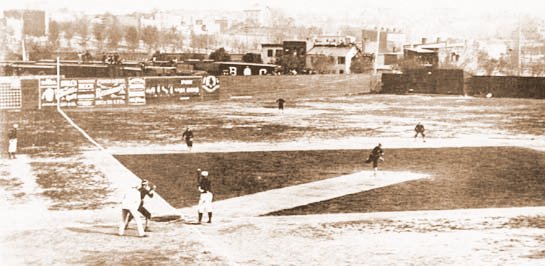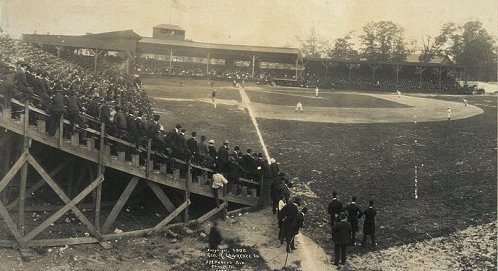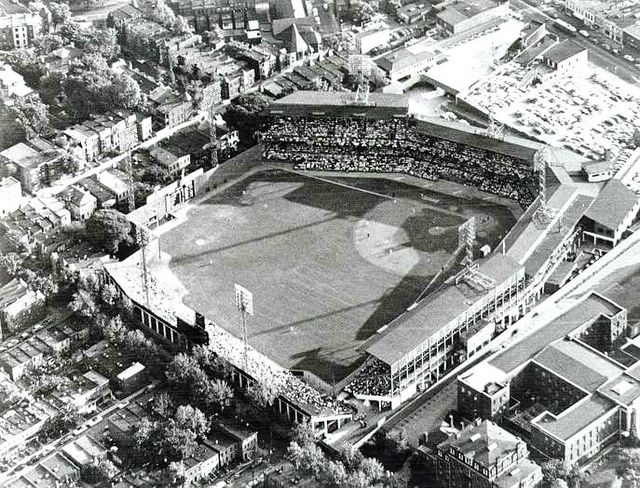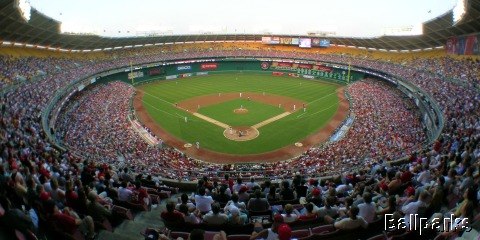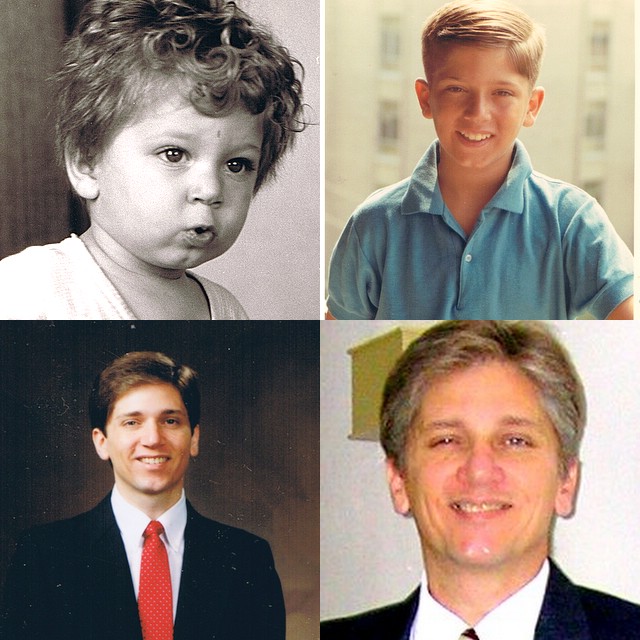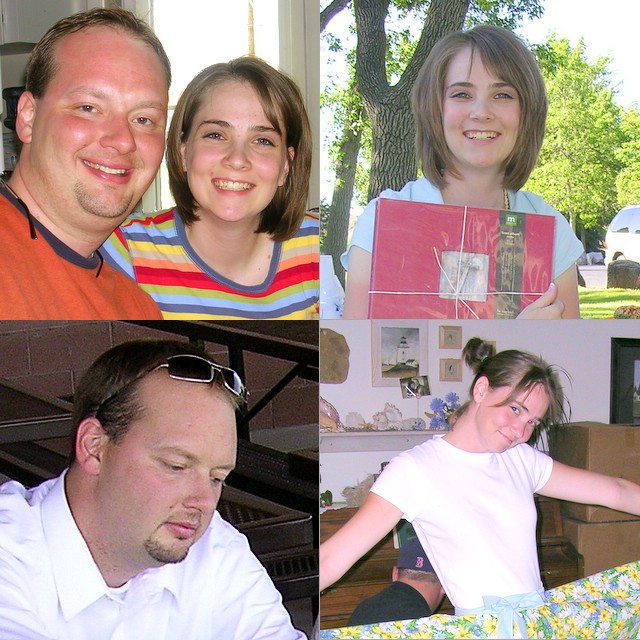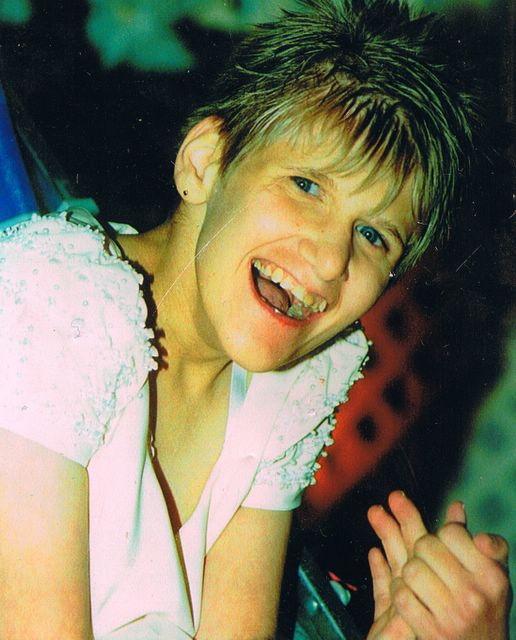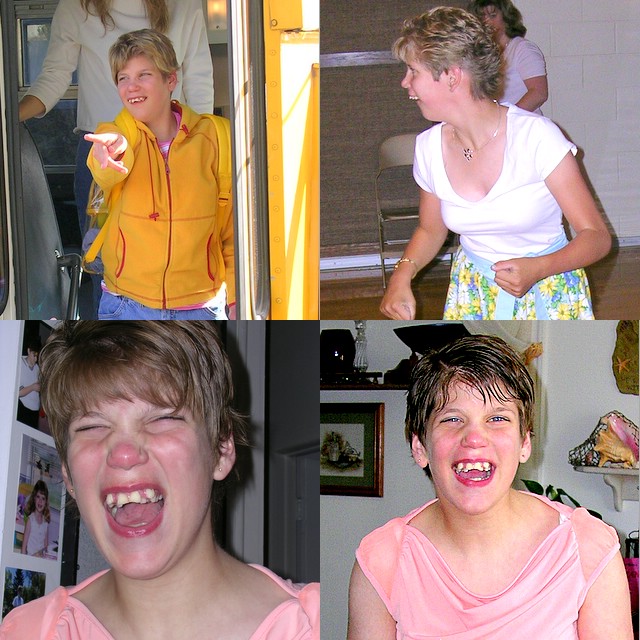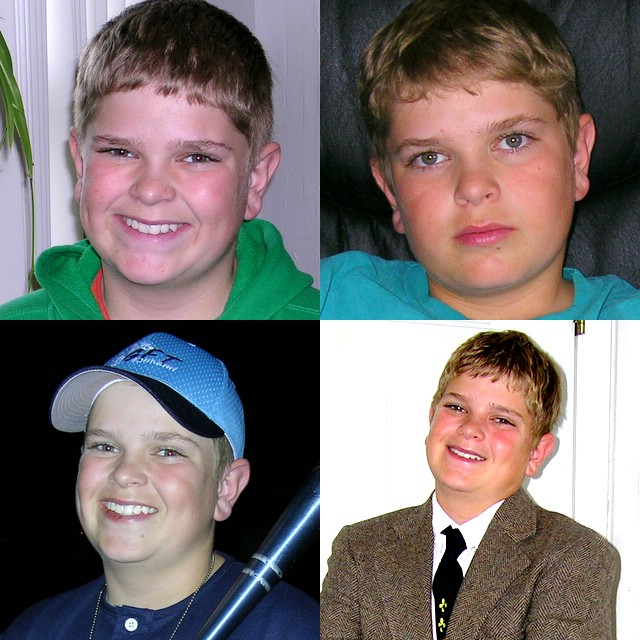F-Rod Now a W-Nat
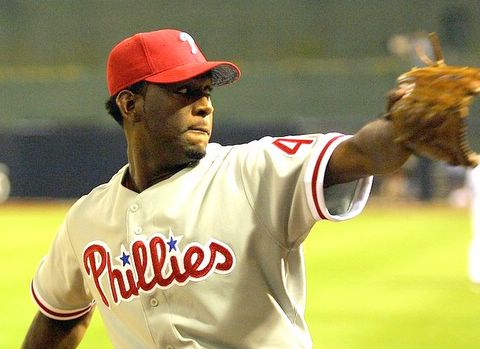 [February 1st] - The Washington Nationals have finally come to agreement with former Yankee's reliever Felix Rodriguez. Rodriguez, 33, signed a one-year, $600,000 contract that could double to $1.2 million if he remains on the Nationals' roster for the majority of the season. Rotoworld.com calls the signing a "bargain" for the Nationals even if all the bonus money is eventually paid.
[February 1st] - The Washington Nationals have finally come to agreement with former Yankee's reliever Felix Rodriguez. Rodriguez, 33, signed a one-year, $600,000 contract that could double to $1.2 million if he remains on the Nationals' roster for the majority of the season. Rotoworld.com calls the signing a "bargain" for the Nationals even if all the bonus money is eventually paid.
Most believed that the signing of lefty Valerio De Los Santos ended any hope of signing Rodriguez, but it was apparently contractual issues, and not desire on either side, that held up the deal until late Tuesday night.
In 2001, Felix Rodriguez ruled the National League. Pitching for the San Francisco Giants, Rodriguez went 9-1, 1.68 with 91 strikeouts in just 80 innings. He continued to pitch well for the Giants and the Phillies between 2002 - 2004, going 24-21, 3.44, striking out 163 in 190 innings. 2005 didn't go well for Rodriguez. Pitching for the Yankees, he had a 5.01 ERA in 32 innings while striking out only 19.
Rodriguez has a fastball that tops out at 98 mph. He has a good slider but most often just dares the hitter to catch up with the heat. Lefties do pretty well against Rodriguez but right-handers might just as well stay on the bench.
Even when including his dismal 2005 season, Rodriguez' last three years look very good. The right-hander has gone 13-10, 3.57 during that span, striking out 123 in 159 innings. From 2003 - 2005, Rodriguez gave up a .254 batting average, .345 on-base percent and .395 slugging average. He is especially hard on lefties, allowing a .229 batting average against (.270 vs righties).
Good job, Jimbo. The Nationals have one of the worst starting lineups but by far and away one of the best bullpens and reserve players.
I feel a Beltway Boys "prognostication" coming up (hey, I predicted 81 wins last January, so I guess you have to listen to me): The signing of Rodriguez and de Los Santos will open the door for the team to package one of the team's existing middle-relievers for some much needed hitting.
If I get this one right, I'm moving to Vegas.
Will D.C. Be Jose Guillen's Last Stop?
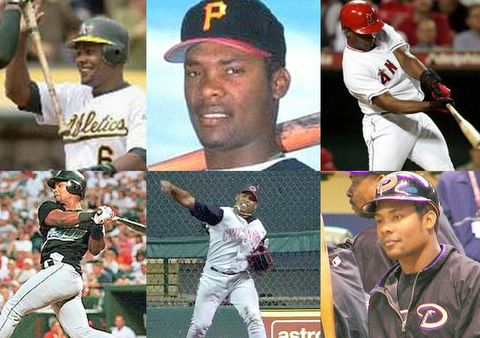 [January 31st] - It's a really weird deal. Jose Guillen, a player that six other team's couldn't wait to get rid of, who caused dozens of other teams to hang up the phone when his name was brought up in trade talk, actually likes it here. The trade that brought Guillen to the Nationals from the Angels was a steal for Washington. Had Bowden held out, he might have been able to get away with sending the Angels a couple of dozen baseballs and a gift certificate to Pizza Hut.
[January 31st] - It's a really weird deal. Jose Guillen, a player that six other team's couldn't wait to get rid of, who caused dozens of other teams to hang up the phone when his name was brought up in trade talk, actually likes it here. The trade that brought Guillen to the Nationals from the Angels was a steal for Washington. Had Bowden held out, he might have been able to get away with sending the Angels a couple of dozen baseballs and a gift certificate to Pizza Hut.
The Nationals are facing another choice within the next few weeks. Guillen will be a free-agent following the 2006 season and will be able to sign with another team for 2007. He has told Jim Bowden he wants to get any deal done before the start of the season; after that, it's got to wait till season's send.
Today, Jose Guillen is telling team officials, and anyone willing to listen, that he wants to remain in D.C. for the long haul. He said it last fall when he was first traded from the Angels, and he's saying it again. The Fredericksburg Free-Lance Star is reporting that Guillen is willing to do just about anything to stay with the team. "Guillen has expressed interest in signing a long-term extension during spring training. Guillen said he does not want to negotiate during the season." Money, he says won't be an issue. "I already told them if I have to defer money I will do that. I want to play where I am going to be happy. I am happy here.  I love the respect people treated me with last year. I really love that. To me this is my second home right now. I really love the people here."
I love the respect people treated me with last year. I really love that. To me this is my second home right now. I really love the people here."
The Nationals are faced with the prospect of losing 3/8ths of their starting lineup to free agency after this season (Nick Johnson, Alfonso Soriano and Guillen). Any decision regarding Johnson can wait until later in the year. Soriano needs to be tended to soon. Guillen has to be signed or left alone by the end of March.
What will Jim Bowden do?
We all know about Guillen's past problems, though the large explosions seem to have abated somewhat. He'll never be a warm and fuzzy personality, but he'll go pretty much un-noticed in a winning locker room. Over the past three years (the only three in his career where he played every day), Guillen averaged .295-28-90 with a .352 on-base percentage and a .515 slugging percent. He's 29 and will likely be able to be a solid producer for another five solid seasons before age begins to take it's toll. My guess is that those kind of numbers will bring Guillen a four-year, $25 million contract. That's a very fair deal as long as Guillen doe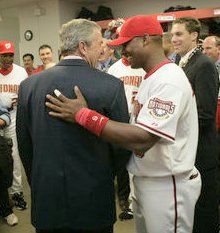 sn't "whack out" during that period. I don't think any other teams would take a chance on him, especially at those kinds of dollars.
sn't "whack out" during that period. I don't think any other teams would take a chance on him, especially at those kinds of dollars.
He'd probably have to take less to go elsewhere.
I would love to have Guillen stay as a member of the Nationals. It's not often that an all-star caliber player lists finances as a secondary issue during contract negotiations. Although this is strange to say, Guillen could be one of the "faces" of D.C. baseball. This is where the ownership issue really hurts the team. Guillen (like many players) doesn't want to hassle with negotiations during the season, and I don't believe that ownership will be in place in time for Bowden to make a multi-year offer (his status isn't as cut-and-dry as was Schneiders). If he has a huge year, there just may be a team desperate enough to take a chance on him next fall.
I doubt that Johnson and Soriano will remain with the team. I believe Guillen will. And that's a good thing.
April Horrors, Not Showers, Set Scene For '06 Nats
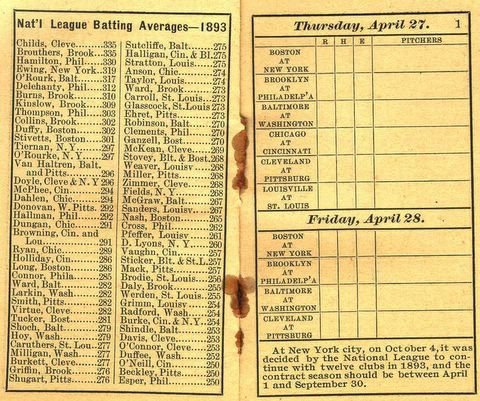 [January 29th] -- The inaugural season of the Washington Nationals began in the city of Philadelphia, and in the first days and weeks that followed, the team played good but not great teams, and were given the opportunity to get used to their new surroundings before facing a very difficult stretch in the schedule.
[January 29th] -- The inaugural season of the Washington Nationals began in the city of Philadelphia, and in the first days and weeks that followed, the team played good but not great teams, and were given the opportunity to get used to their new surroundings before facing a very difficult stretch in the schedule.
Not in 2006.
After playing the presumptive NL best Mets in New York in games 1-2-3, the Nationals travel to Houston to play the NL Champion Astros for a four-game series. Then it's on to Washington to play the Mets for three more games before gaining a brief respite by playing the Marlins for three games before facing the division champion Braves for three games. After a series against the Reds, it's on off to face the Central division champions St. Louis Cardinals.
All this before May 1st.
It'll be a tough April, with a record that might look too impressive. Hang on, my brethren. It'll get better.
When In Doubt, Make It Up
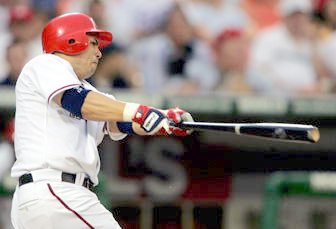 [January 29th] - Sometimes, you just have to wonder who plays looser with the facts, bloggers or writers at the big sports sites.
[January 29th] - Sometimes, you just have to wonder who plays looser with the facts, bloggers or writers at the big sports sites.
Eric Mack over at CBS.com has an overview of the problems the team is facing with the glut of second baseman and outfielders. Unsettled doesn't begin to describe the National's lineup.
Mack comes up with a possibility no one has yet to consider. According to Mack, "Our guess is Vidro winds up volunteering to settle the drama before camp by taking on left-field duties -- unless the Nats talk Soriano into it first."
Either Mack has access to information not available to any one else in the world, or he's just filling space during a slow news cycle. I remember Vidro specifically saying that while he sympathizes with Soriano's plight and understands that he doesn't want to change positions, he wasn't about to change positions himself to placate the disturbed Soriano. How does that translate into his willingness to move to the outfield?
I'm guessing that, if forced to believe Eric Mack on Jose Vidro, or Jose Vidro on Jose Vidro, I'm going to choose the "horses mouth" so to speak.
Will Sammy Get His Groove Back?
 [January 29th] - It's only a matter of a few short weeks before pitchers and catchers begin to report to spring training camps across Florida and Arizona, and still, Sammy Sosa continues to relax at his Miami home, chatting with Jim Bowden as it suits him, and preparing to begin his 18th major league season.
[January 29th] - It's only a matter of a few short weeks before pitchers and catchers begin to report to spring training camps across Florida and Arizona, and still, Sammy Sosa continues to relax at his Miami home, chatting with Jim Bowden as it suits him, and preparing to begin his 18th major league season.
The only question is, where?
Well, actually, where isn't the question. That's the only certainty in this Miami melodrama. It's going to be in Washington D.C. and it's he's going to play for the Nationals. Oh sure, Sosa and his agents whine and posture in conversations with the Nationals' representatives, but truth be known (and everybody knows the truth), The Nationals are Sosa's only hope of redemption.
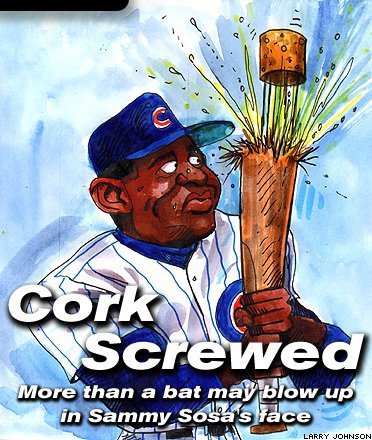 Two Japanese teams are very interested in the aging Dominican, but Sosa has no interest in playing outside of the United States. He needs only 12 more home runs to reach the magical mark of 600, and hitting them in Sapparo and Sendai just won't count. No other major league teams are interested in the aging slugger, and some are giggling at Bowden's interest in Sosa.
Two Japanese teams are very interested in the aging Dominican, but Sosa has no interest in playing outside of the United States. He needs only 12 more home runs to reach the magical mark of 600, and hitting them in Sapparo and Sendai just won't count. No other major league teams are interested in the aging slugger, and some are giggling at Bowden's interest in Sosa.
No, it's the Nationals or Sosa will be spending his evenings in Coconut Grove. He's arguing with Jim Bowden over the structure of the agreement, where the ducats will be coming from and how many he'll get, but rest assured, come spring training, he'll be a National. Had Jose Guillen's surgery allowed for his opening the season in New York, I'd have put Sosa's chances of being a National at only 50/50. But the team cannot afford beginning the 2006 season as they ended 2005, with almost as many players on the injured reserve list as on the 25 man roster. There 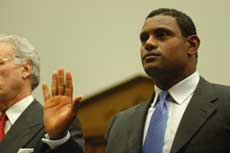 is no player on the roster today who could step in and bat cleanup while Guillen mends.
is no player on the roster today who could step in and bat cleanup while Guillen mends.
The Nationals need Sosa, and Sosa needs the Nationals.
The team doesn't want to be out of contention come May 1st, and Sosa doesn't want to end his career with those awful Baltimore numbers and the memories of corked bats and steroid-aided long balls blocking his entry into Cooperstown. Guillen's situation might force Bowden to throw a little guaranteed money at Sammy, but he'll come. Oh, he'll come alright.
Giving The Bird To Baltimore
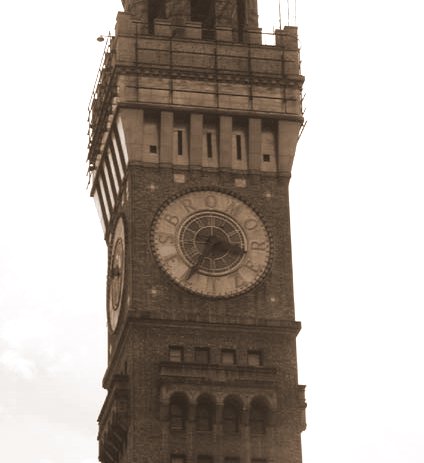 [January 28th] - Now that baseball in Washington has completed its first season, it's time to proclaim once and for all that Baltimore is for the birds.
[January 28th] - Now that baseball in Washington has completed its first season, it's time to proclaim once and for all that Baltimore is for the birds.
As a young man growing up in D.C., Baltimore was strictly "second-city." After all, Washington had NATIONAL Airport. Baltimore had Friendship Airport. Our city was named after the man who won the Revolutionary War. Their city was named after a British Lord, and according to my Fairfax County Public Schools education, they're the ones who lost the war. My first trip into Baltimore was in 1964. I remember vividly the Baltimore City clock tower. It had black block letters across its face, and as I stared through the windshield of my Father's Buick Wildcat, the words became readable. "Bromo Seltzer." Bromo Seltzer?? "Dad," I began, "Why did Baltimore put 'Bromo Seltzer' on their city clock?" "Because," my Dad began, with that rich, reassuring voice that all fathers had in the early '60s, "It is a reminder to take it because living in Baltimore makes you sick."
Now, that's not why I disliked Baltimore. It was the Orioles. The Senators invited them to leave St. Louis and play in our back yard, and they repaid us by beating the snot out of us every time we played. The Orioles would trade for Frank Robinson and the Senators would trade for Greg Goosen [sigh]. In 1969, the Senators won 86 games and were competitive the entire year. The Orioles won twenty games more and went to the World Series. In baseball, Washington was the weak sister. When Robert Short did to Washington what he did to Minneapo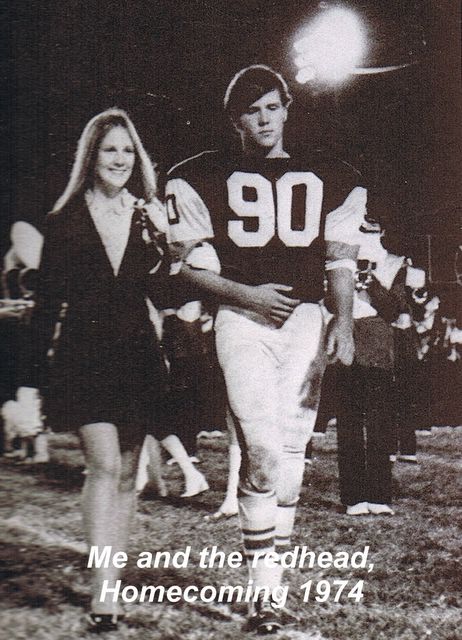 lis a dozen years earlier, I was crushed [bet you didn't know he was the Lakers owner who moved them to L.A. - that's why they are the "Lakers," because Minnesota is known as the "land of 10,000 lakes"]. But even Robert Short's "Texas Two-step" couldn't make me an Oriole fan. For five years, I rooted for the Redskins and the Bullets, and spent my summers at Ocean City. But things changed in 1976. Her name was Sharon. Having dated many girls, Sharon was the first "woman" I had gone out with. I had known her throughout high school and had been friends, but I was never considered to be in her "league."
lis a dozen years earlier, I was crushed [bet you didn't know he was the Lakers owner who moved them to L.A. - that's why they are the "Lakers," because Minnesota is known as the "land of 10,000 lakes"]. But even Robert Short's "Texas Two-step" couldn't make me an Oriole fan. For five years, I rooted for the Redskins and the Bullets, and spent my summers at Ocean City. But things changed in 1976. Her name was Sharon. Having dated many girls, Sharon was the first "woman" I had gone out with. I had known her throughout high school and had been friends, but I was never considered to be in her "league."
She was an avid Oriole fan, and wanted to see a game in Baltimore. Hmmmm. Hatred of the Orioles vs. a vivacious redhead [actually, the decision was closer than you'd think]. Just a few days before our country's Bi-centennial, Sharon and I zipped down the parkway towards Baltimore in her yellow VW convertible. I had a great time until we pulled into the Memorial Stadium parking lot. I got kind of clammy. My stomach began to hurt.
There before me wa s Memorial Stadium. It was nothing like RFK.
s Memorial Stadium. It was nothing like RFK.
RFK was [at this time] sleek and modern, and Memorial Stadium looked out of date, with its brick façade and 1930's brushed aluminum lettering. I kept muttering to myself, "vivacious redhead...vivacious redhead" as we walked into the stadium.
I still don't get it. Here, in the middle of a large urban city, sitting among 35,000 people, the loudspeakers blared John Denver's "Thank God I'm A Country Boy" after each inning. Didn't see a single country boy in the stands. And people from Baltimore must like the sun, because there was no roof on the stadium and I boiled like a crab from their harbor. Oh, and the game stunk. Reggie Jackson hit two homeruns and Doug DeCinces made a couple of good defensive plays, but the O's lost 14-6 to the Angels. But I couldn't watch the game. I just couldn't All around me were these giant Oriole bird faces with huge grins, staring right at me! They were laughing at me because Baltimore had a baseball team and I didn't. When we got home, the redhead wasn't feeling very vivacious because her team had lost, and she asked me to leave so she could "rest." Crap. The Orioles were even destroying my love life!
I had to get away from that stupid bird. I moved to Pocatello, Idaho 15 years ago, where I don't have to see that beaky bird mocking my misfortune. Alas, the wrongs of the world have been righted with baseball again being part of my life. This time, Washington has Frank Robinson, and the Orioles have the modern day equivalents of Greg Goosen and Jim French. Just as Sir Peter feared, the Orioles will be but a postscript in Washington history. Way back there, in the deep recesses of Washington's memory junkpile, next 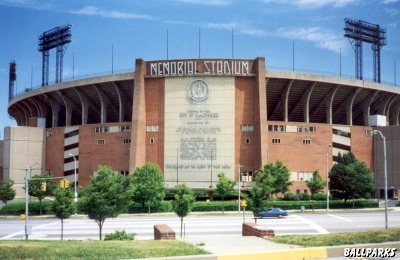 to the A, B & W Bus company, People's Drug Stores and Glen Echo Amusement Park, will be the faint odor of the Orioles.
to the A, B & W Bus company, People's Drug Stores and Glen Echo Amusement Park, will be the faint odor of the Orioles.
Thirty years from now, a young boy will dig up an old picture of his dad wearing an Oriole's cap and, with tears in his eyes, ask "Why?" "Son," the dad will begin, using lyrics from a song that rocked D.C. the summer of the Senators greatest year, 'If you can't be with the one you love, love the one you're with.'" Baltimore, we were lonely. We're not lonely anymore. Deal with it.
Ward, De Los Santos Come Aboard, But Hey, What Happened To Felix Rodriguez??
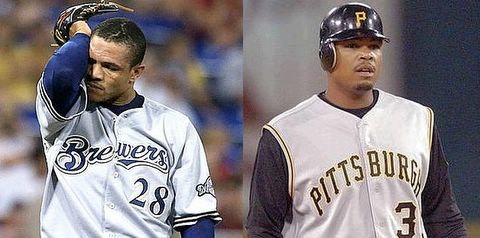 [January 27th] -The Nationals signed on Friday pitcher Valerio De Los Santos and first baseman Daryle Ward. The signing of Ward is no surprise as it's been rumored for several days, but the acquisition of De Los Santos came out of the blue. Felix Rodriguez was the name mentioned coming to Washington (and still may as several sites reported on Wednesday that his deal was "done."
[January 27th] -The Nationals signed on Friday pitcher Valerio De Los Santos and first baseman Daryle Ward. The signing of Ward is no surprise as it's been rumored for several days, but the acquisition of De Los Santos came out of the blue. Felix Rodriguez was the name mentioned coming to Washington (and still may as several sites reported on Wednesday that his deal was "done."
De Los Santos went 1-2, 6.14 in in 22 innings with the Marlins, striking out 16 and walking 12. He has a decent 7-8, 4.33 career mark in four major league seasons. He has also played for the Brewers, Phillies and the Blue Jays. De Los Santos' career looked promising before blowing our his arm in 2002 while playing with the Brewers. Before being injured, De Los Santos had a 2-3, 3.12 record in 67 innings.
In 2005, Ward batted .260-12-63 in just over 400 at bats. He has tremendous power and hits well in clutch situations, but tends to be too aggressive when behind in the count. Defensively, he's 'average' at best. He can play the outfield as well as first, and can do a credible job as a platoon player.
Ward's "internals" indicate just why he remains unsigned this close to spring training. He hit only .200 against left-handers vs. .281 when facing righties. His .318 on-base percentage for 2005, and .309 for his career, are numbers reserved for slick-fielding shortstops and not slugging first baseman. Strangely, he went only 5-60 (.083) at three of the most hitter-friendly parks in the National League, Wrigley Field, Busch Stadium and SBC Park in San Francisco.
I don't see De Los Santos as having much of a chance of making the team coming out of spring training, not with Joey Eischen and Mike Stanton already part of the bullpen staff. He'll likely be a spare-part kept at 'AAA' New Orleans, just in case something goes wrong in D.C.
Now, As to Daryle Ward. I might be completely wrong here, but follow this logic:
- The Nationals wouldn't have signed Ward to play at 'AAA' New Orleans because that's where young Mr. Broadway is refining his game in hopes of making the big club in 2007.
- They wouldn't have signed Ward as the backup first baseman because Robert Fick is already there. Fick is far more versatile and can play left or right field as well as catch in addition to playing first.
- My guess is that Ward may end up being part of a platoon at first in 2006 (I couldn't say if it's on opening day or sometime in July) with Nick Johnson traded for prospects and/or pitching.
Johnson is a free agent at the end of the 2006 season, and unless he remains 100% healthy and hits above his apparent "285-20-80" lot in life this year, I don't think the Nationals will want to resign him. and having been stung by the departures of Esteban Loiaza and Hector Carrasco this past fall, Nationals' GM Jim Bowden won't want to lose Johnson and get nothing in return.
Like I said, I could be wrong, but the signing of Ward does have a "sneaky" Bowden-like quality to it.
Although I haven't heard a thing, I'm guessing the De Los Santos signing doesn't effect Felix Rodriguez as they wouldn't have the same responsibilities coming out of the bullpen.
Will RFK Have 'Nick At Night' Next Summer?
 [January 27th] - I was stunned when I read that Nationals' first baseman Nick Johnson will be a free-agent at the end of the 2006 season. Johnson, 27, has played only 452 games in the major leagues, the equivalent of less than three 162 game seasons.
[January 27th] - I was stunned when I read that Nationals' first baseman Nick Johnson will be a free-agent at the end of the 2006 season. Johnson, 27, has played only 452 games in the major leagues, the equivalent of less than three 162 game seasons.
And he's going to be able to walk come October. Those players have one heckuva union.
Okay, so lets cut to the chase. Forget the dollars for a moment. Do we want Nick Johnson back in 2007?
If you look at a 162 game average of what he's done in the major leagues, Johnson's stats break down this way: .265-18-78, .383 obp and .437 slugging average. His minor league seasonal average was .304-17-87. This indicates a couple of things. First, the consistency of his major and minor league career indicate that he's hitting as well as he's ever going to. .300-20-100 is the high end of Nick Johnson's bat. Secondly, ... well, actually there was only that first thing. But that was a pretty big first thing, wasn't it?
Every January, all the magazines and baseball websites break down the players by position. Every one that I've come across had Nick Johnson listed as a "second tier" first baseman, below the Carlos Delgado's and Derek Lee's but above the J.T. Snow's and Ken Harvey's, side by side with "nice" first baseman like Sean Casey and Lyle Overbay.
Being mentioned in the same breath with Casey and Overbay isn't too bad; kinda nice really. But what do both Lyle Overbay and Sean Casey have in common? They were both traded this off season. Casey ended up in Pittsburgh and Overbay in Toronto. Something else they have common is that both of them lost their jobs to young, slugging first baseman. There is no way that Prince Fielder in Milwaukee and Adam Dunn in Cincinnati come close to Casey's and Overbay's overall talent. But when they swing and don't miss, the ball goes far. Very far.
So it's fair to assume that most team's don't think they can "win" with a "nice" hitter at first base. Guys like Casey and Overbay (and Johnson) are fine as long as t he team's goal is to finish close to .500. But Milwaukee is now loaded with young talent and they think they're ready to make a move up in the standings, so they jettisoned Overbay. The Reds, with new ownership and management, believe that they are close to making noise in the NL Central, so they jettison Casey. The Pirates, a team with .500 as a goal, scooped him up. The Blue Jays, who haven't made much noise in the AL East since the first Clinton administration, grabbed Overbay.
he team's goal is to finish close to .500. But Milwaukee is now loaded with young talent and they think they're ready to make a move up in the standings, so they jettisoned Overbay. The Reds, with new ownership and management, believe that they are close to making noise in the NL Central, so they jettison Casey. The Pirates, a team with .500 as a goal, scooped him up. The Blue Jays, who haven't made much noise in the AL East since the first Clinton administration, grabbed Overbay.
And then there's the Nationals.
As spring training grows closer, whispers about minor league slugger Larry Broadway are becoming louder. Jim Bowden spoke eloquently of him last week. So did Bill Ladson. It's always the same. "Broadway will be ready in 2007." "He was one of the bright spots of the Arizona Fall League." "The guy has a cute butt."
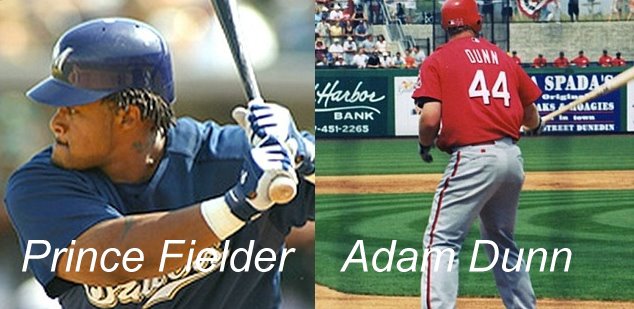 Well, the last one was from my 16 year old daughter.
Well, the last one was from my 16 year old daughter.
Nick Johnson has a perfect swing for RFK Stadium. He slaps. He hits line drives. The deep fences probably help him more than they hurt him. But considering that RFK is temporary, and based on the anger the deep fences have caused thus far, the new park, at best, will be "neutral." Johnson may have trouble in the new park, as he doesn't have enough power to get the ball over the fence, and not enough speed to turn ground balls to the fence into anything more than long singles.
I think the only way that Nick Johnson returns to the Nationals' in 2007 is if he gets injured again. If he doesn't, then no other team would be willing to take a chance on him as a free agent. Call it the Tony Armas syndrome. If he does stay healthy, he'll likely be offered far more from other teams than he would from the Nationals with Larry Broadway waiting in the wings.
Bowden's attempt to sign Daryle Ward is indicative that first base is in a state of flux right now. Johnson may be traded during spring training for some pitching, with Ward, Robert Fick and a cast of thousands holding down the position until Broadway is ready.
If Ward is signed, I think we can say goodbye to Nick sometime during the season. And that's too bad. I like him. He's "nice."
New Reds' Regime Ready To Deal Kearns
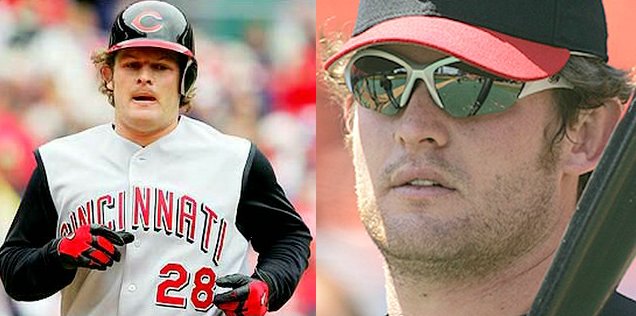 [January 26th] - Ken Rosenthal of Fox Sports is reporting this morning that the Cincinnati Reds' new ownership and team general manager Bob Kullman wants to make a deal before spring training, and that Austin Kearns is the most marketable, most coveted player they have.
[January 26th] - Ken Rosenthal of Fox Sports is reporting this morning that the Cincinnati Reds' new ownership and team general manager Bob Kullman wants to make a deal before spring training, and that Austin Kearns is the most marketable, most coveted player they have.
With the old guard still in power, their was no chance that they would discuss the weather with former Reds' and current Nationals' GM Jim Bowden, little alone discuss a trade. With that barrier now gone, something just may happen.
Kearns, 25, has been the odd-man out in the Reds' outfield for a while now and has yet to produce at the level the team hoped. The Royals, Cardinals and Cubs join the Nationals as teams interested in making a trade for Kearns.
The Reds had talked to the Royals in November about a possible trade, but Kansas City wouldn't part with pitcher Zack Grienke at the time. It isn't clear if the Nationals have anyone that would interest the Reds management at this time.
By folding Kearns' 1268 career at-bats into a 500 at-bat season, he would hit somewhere in the area of .266-22-88 with a .360 OBP and a .471 SLG average. He strikes out a lot, however. He struck out 107 times in just 387 at bats.
Here's the weird part. If you had to pick a current major league player whom he most resembles, a player with a low batting average, good power and tons of strikeouts, someone with a pretty good on-base percent for a heavy hitter, it would be Brad Wilkerson. And the Nationals just traded him because that mix of quality and deficiency wasn't what the team was looking for.
And just like Wilkerson, Kearns is from Kentucky.
Go figure.
Loose Ends Starting To Come Together
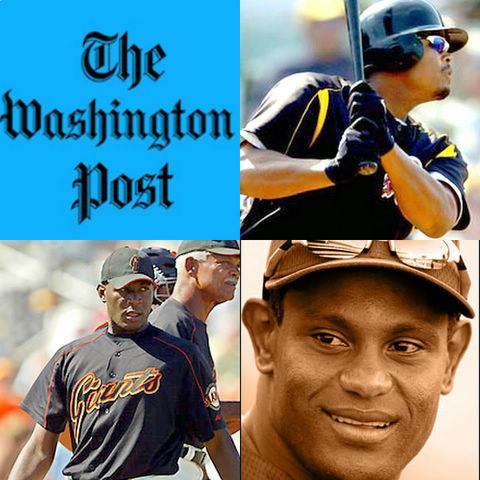 [January 26th] - The Washington Post's Barry Svrluga updates the Nats' Nation on the "goings on" of the Pep Boys, Manny, Moe and Jack. No, wait a minute. That should read Sammy, Felix and Daryle.
[January 26th] - The Washington Post's Barry Svrluga updates the Nats' Nation on the "goings on" of the Pep Boys, Manny, Moe and Jack. No, wait a minute. That should read Sammy, Felix and Daryle.
Sammy Sosa: After two weeks of lighting votive candles and chanting "harm-me-oh-in-geck-e-o" over and over, it seems that we may have misread the entire "Sosa Experience" entirely.
Reports Svrluga (I don't think I ever spell his name the same twice in a row): To this point, the Nationals have been unwilling to guarantee Sosa any money and are merely inquiring whether the 1998 National League MVP would be interested in trying to make the team. The competition for Sosa appears to be scant.
After Burning Jim Bowden in effigy across the blog-0-sphere, it seems that Bowden has never been willing to offer a dime of guaranteed money to Sammy. Oh well.
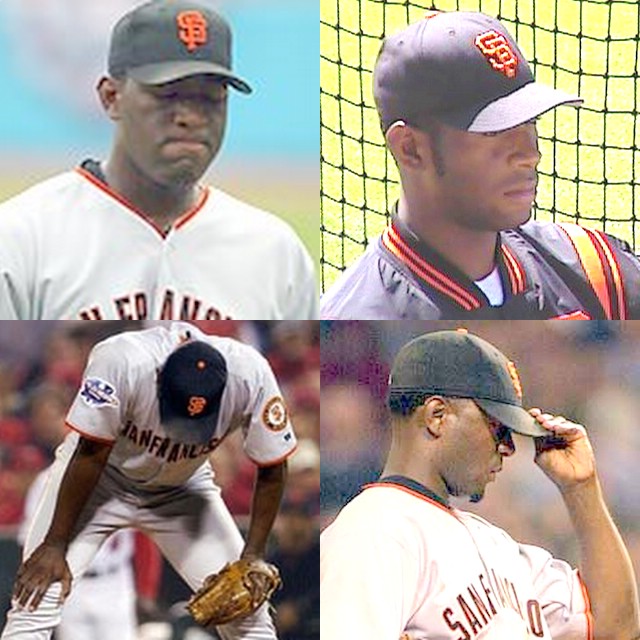 It was fun torching him anyway. Since Sosa has said he won't play in Japan, and since there is no one else looking to sign him, he can either sign a minor-league contract with the Nationals or call it a career. My guess (still) is that he'll sign a contract with the Nats, have a good spring and make the team as the starting left-fielder.
It was fun torching him anyway. Since Sosa has said he won't play in Japan, and since there is no one else looking to sign him, he can either sign a minor-league contract with the Nationals or call it a career. My guess (still) is that he'll sign a contract with the Nats, have a good spring and make the team as the starting left-fielder.
Felix Rodriguez: Svrluga reports that the Nationals are "close" to signing Rodriguez. Add the Denver Post report that Washington WILL sign Rodriguez and it's a same to assume it's a done deal.
In 2001, Felix Rodriguez ruled the National League. Pitching for the San Francisco Giants, Rodriguez went 9-1, 1.68 with 91 strikeouts in just 80 innings. He continued to pitch well for the Giants and the Phillies between 2002 - 2004, going 24-21, 3.44, striking out 163 in 190 innings. 2005 didn't go well for Rodriguez. Pitching for the Yankees, he had a 5.01 ERA in 32 innings while striking out only 19.
Rodriguez has a fastball that tops out at 98 mph. He has a good slider but most often just dares the hitter to catch up with the heat. Lefties do pretty well against Rodriguez but right-handers might just as well stay on the bench.
Even when including h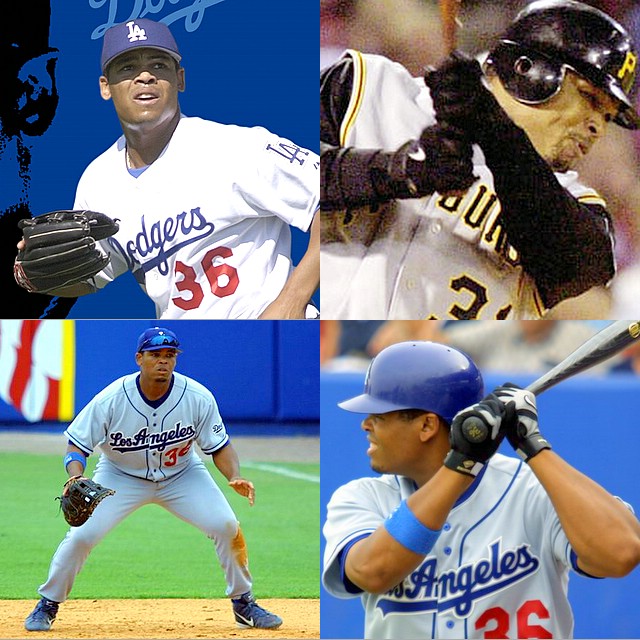 is dismal 2005 season, Rodriguez' last three years look very good. The right-hander has gone 13-10, 3.57 during that span, striking out 123 in 159 innings. From 2003 - 2005, Rodriguez gave up a .254 batting average, .345 on-base percent and .395 slugging average. He is especially hard on lefties, allowing a .229 batting average against (.270 vs righties).
is dismal 2005 season, Rodriguez' last three years look very good. The right-hander has gone 13-10, 3.57 during that span, striking out 123 in 159 innings. From 2003 - 2005, Rodriguez gave up a .254 batting average, .345 on-base percent and .395 slugging average. He is especially hard on lefties, allowing a .229 batting average against (.270 vs righties).
This one makes sense.
Daryle Ward: Svrluga also says that the team is also near a deal with former phenom Daryle Ward. I'm surprised that no one has picked up the 30 year old Ward, who played for the Pirates the past two seasons.
In 2005, Ward batted .260-12-63 in just over 400 at bats. He has tremendous power and hits well in clutch situations, but tends to be too aggressive when behind in the count. Defensively, he's 'average' at best. He can play the outfield as well as first, and can do a credible job as a platoon player.
Ward's "internals" indicate just why he remains unsigned this close to spring training. He hit only .200 against left-handers vs. .281 when facing righties. His .318 on-base percentage for 2005, and .309 for his career, are numbers reserved for slick-fielding shortstops and not slugging first baseman. Strangely, he went only 5-60 (.083) at three of the most hitter-friendly parks in the National League, Wrigley Field, Busch Stadium and SBC Park in San Francisco.
I want Rodriguez on the team, and I'd like Sosa on the team. Ward is a good "piece" of the puzzle for the team, but the only way this works is if Nick Johnson gets traded before he reaches free-agency next season or if Robert Fick becomes the primary backup catcher. Other than that, Ward's is just enjoying the sights that Vierra has to offer.
Should make for an interesting spring training.
Sometimes, A Crystal Ball Is Just A Large Chunk Of Glass
 [January 25th] - It was an interesting "on-line" chat yesterday. Barry Svrluga, the Washington Post's baseball super-scribe, hithered and dithered throughout the Q & A, offering answers that were both tepidly vague and overly specific. He did his usual great job.
[January 25th] - It was an interesting "on-line" chat yesterday. Barry Svrluga, the Washington Post's baseball super-scribe, hithered and dithered throughout the Q & A, offering answers that were both tepidly vague and overly specific. He did his usual great job.
Three of his responses caught my eye, however, and not in a particularly good way. He sounded "down" and "blue" when describing the team's chances for 2006:
The first:
Vienna, Va.: Your NL East predictions?
Barry Svrluga: All right, I'll take the bait provided by Omar Minaya:
1. Mets (although I'll probably be proven a sucker by September)
2. Braves
3. Phillies
4. Marlins
5. Nationals
And the second:
Washington, D.C.: Come on the Nats aren't going to be that bad. Look how bad things looked last year. The Marlins? Please. The Nats will win 70+ games easy.
Barry Svrluga: Someone is seeing sunny skies here in DC.
And this:
Washington, D.C.: Are we going to finish ahead of the Marlins??
Barry Svrluga: It will be a compelling battle. First one to 70 victories wins?
It looks like Barry has once again gazed into his crystal ball and have found the Nationals "wanting." He sees the Marlins, a rag-tag bag of Class 'A' prospects as somehow equal to, or even better than, the Washington Nationals.
Why?
Here is the Marlins starting lineup as of right now:
- 1b-Mike Jacobs
- 2b-Pokey Reese
- ss-Hanley Ramirez
- 3b-Miguel Cabrera
- lf-Chris Aguila
- cf-Eric Reed
- rf-Jeremy Hermida
- Starters:
- Dontrelle Willis
- Sergiio Mitre
- Brian Moeller
- Jason Vargas
- Josh Johnson
In what universe is this lineup in any way comparable to the one the Washington Nationals will trot onto the field on opening day in New York next March? True, there are some quality prospects in that lineup, but they haven't come close to proving their abilities at the major league level yet.
If Nick Johnson is hurt, if Cristian Guzman continues his downward spiral, if Marlon Byrd reverts to his slap-happy ways, if Jose Vidro's knee is still gimpy, if Ryan Zimmerman's three weeks in the spotlight late last season was luck and not ability, if Jose Guillen stops taking his medication, if, if, if, then sure, the Nationals might finish in last place.
But really, what's the chance? Doesn't the previous paragraph sound very much like the 2005 Washington Nationals? In my many, many (many) years of being a baseball fan, I have never seen disaster strike a team two years in a row (unless the team brought it on themselves, of course). That's why I think Johnson will be healthy, Vidro will return to form, Byrd will continue to improve and Jose Guillen won't kill anybody.
My guess is, unless the baseball gods favor the Marlins (and if he did, they'd have a new stadium), that Florida will win 67 games, 16 fewer than they did last year. In real talent, the Nationals are 5-7 games worse then they were in 2005, but those games should be made up in head-to-head competition with the Marlins.
If the Nats' have the league average number of injuries (the team used a league record 57 players last year) and only one or two players with career worst seasons, then I believe they can win 79-83 games.
And considering what the team has gone through since October of 2004, that will be an amazing feet.
Scraping The Bottom Of The Barrel Or Shrewed Personnel Management?
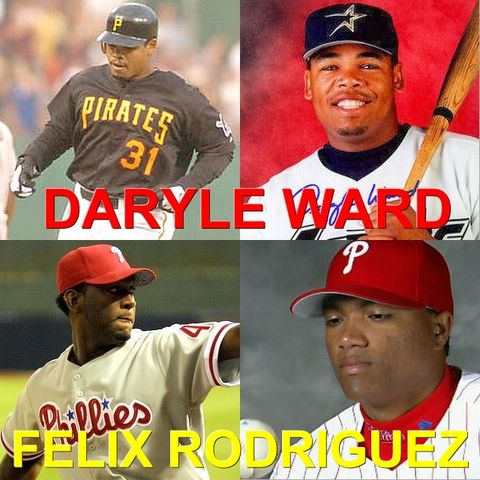 [January 24th] - I thought when the Washington Nationals signed Robert Fick two months ago, they filled their need for all things first-base, and that Mike Stanton pretty much filled out the team's bullpen.
[January 24th] - I thought when the Washington Nationals signed Robert Fick two months ago, they filled their need for all things first-base, and that Mike Stanton pretty much filled out the team's bullpen.
Perhaps not.
The Nationals' website ran a story late Monday night indicating that team GM Jim Bowden has offered minor league deals to first-baseman Daryle Ward and relief pitcher Felix Rodriguez.
I'm surprised that no one has picked up the 30 year old Ward, who played for the Pirates the past two seasons. In 2005, Ward batted .260-12-63 in just over 400 at bats. He has tremendous power and hits well in clutch situations, but tends to be too aggressive when behind in the count. Defensively, he's 'average' at best. He can play the outfield as well as first, and can do a credible job as a platoon player.
Ward's "internals" indicate just why he remains unsigned this close to spring training. He hit only .200 against left-handers vs. .281 when facing righties. His .318 on-base percentage for 2005, and .309 for his carrer, are numbers reserved for slick-fielding shortstops and not slugging first baseman. Strangely, he went only 5-60 (.083) at three of the most hitter-friendly parks in the National League, Wrigley Field, Busch Stadium and SBC Park in San Francisco.
OK. So why would the Nationals want a third left-handed first baseman? Is it possible that Bowden is considering moving Johnson for pitching and looking to Fick and/or Daryle Ward to take the majority of at-bats at first? Hmmmm??
In 2001, Felix Rodriguez ruled the National League. Pitching for the San Francisco Giants, Rodriguez went 9-1, 1.68 with 91 strikeouts in just 80 innings. He continued to pitch well for the Giants and the Phillies between 2002 - 2004, going 24-21, 3.44, striking out 163 in 190 innings. 2005 didn't go well for Rodriguez. Pitching for the Yankees, he had a 5.01 ERA in 32 innings while striking out only 19.
Rodriguez has a fastball that tops out at 98 mph. He has a good slider but most often just dares the hitter to catch up with the heat. Lefties do pretty well against Rodriguez but right-handers might just as well stay on the bench.
Even when including his dismal 2005 season, Rodriguez' last three years look very good. The right-hander has gone 13-10, 3.57 during that span, striking out 123 in 159 innings. From 2003 - 2005, Rodriguez gave up a .254 batting average, .345 on-base percent and .395 slugging average. He is especially hard on lefties, allowing a .229 batting average against (.270 vs righties).
Bowden is hoping that Rodriguez will become the 2006 version of Hector Carrasco, and he just may.
Initial reaction: Rodriguez would be a welcome addition to the Nationals' bullpen. RFK's expansiveness will help deflect some of his fastballs that go right down the heart of the plate. He would be a great situational pitcher, against lefties when the team needs a strikeout badly for example. Ward, however, is another story. He's servicible, but only in a platoon setting, and there is no way the team would start April with Ward at 'AAA' New Orleans; that's where heir apparent Larry Broadway will reside next season. No, I have this feeling that something may be happening at first base involving Nick Johnson. Bill Ladson reported early Monday that he expected Larry Broadway to be given every opportunity to win the starting job at first for the Nats in 2007, and that might as well have come from the mouth of Bowden himself. If Johnson is on the trading block, then a potential signing of Ward makes sense. Perhaps Johnson will be an "throw in" in a deal that gets Alfonso Soriano out of Washington.
So much for the "slow news days" that we've been dealing with the past couple of days.
2003: The Year Hope Died
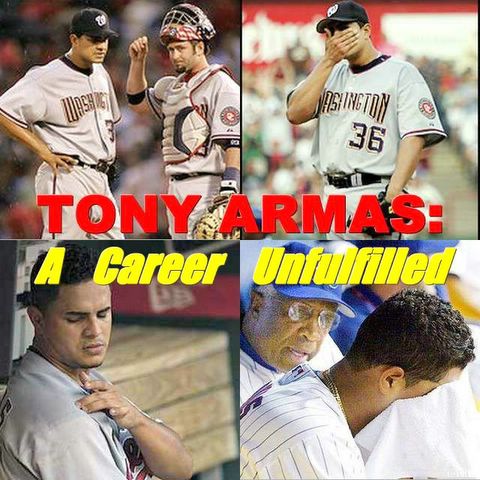 [January 21st] -- It was the last spring training game of 2003. Tony Armas squinted in the Florida sunshine as he leaned in towards catcher Michael Barrett to get his sign. The Mets' Jason Phillips danced off of third base. Armas came set and snapped off a curve ball that caught Ty Wiggington looking. "Strike three -- three outs!" bellowed the umpire. His day done, Armas began to run laps in the outfield, satisfied with both his outing that day and his effort during the spring. In 19 innings, Armas had given up only 3 runs while striking out 21 batters. Finally, the potential that had caused first the Red Sox, and then the Expos to acquire him, had been transformed to success on the field. He was confident that 2003 was going to be his breakout season.
[January 21st] -- It was the last spring training game of 2003. Tony Armas squinted in the Florida sunshine as he leaned in towards catcher Michael Barrett to get his sign. The Mets' Jason Phillips danced off of third base. Armas came set and snapped off a curve ball that caught Ty Wiggington looking. "Strike three -- three outs!" bellowed the umpire. His day done, Armas began to run laps in the outfield, satisfied with both his outing that day and his effort during the spring. In 19 innings, Armas had given up only 3 runs while striking out 21 batters. Finally, the potential that had caused first the Red Sox, and then the Expos to acquire him, had been transformed to success on the field. He was confident that 2003 was going to be his breakout season.
Manager Frank Robinson certainly thought so, and tabbed the then 25 year old as the team's opening day starter against the mighty Atlanta Braves, who had just won their 13th consecutive division title. Armas would face four-time Cy Young award winner Greg Maddux.
It wasn't close.
Orlando Cabrera's two out, two on, two run home run opened the flood gates as the Expos scored four runs in the first inning, allowing Tony Armas to cruise to a 10-2 victory over Atlanta. Armas pitched 6 innings, giving up only 1 run on 5 singles. During the post game interview, Frank Robinson told the press that Armas had "turned the corner," and would finally develop into the dominant pitcher the team had always envisioned he would become.
His second game, against the Mets, wasn't quite as good. He gave up 3 runs in 5 innings in a 3-1 loss to New York. His next start, against the Cubs, was as dominant as the National League had seen that season. In 7 innings, Armas gave up only 3 singles while striking out 11 in a 7-1 pasting of Chicago. Game four was a rematch against the Braves in Montreal. Armas threw another 7 stellar innings, giving up only 3 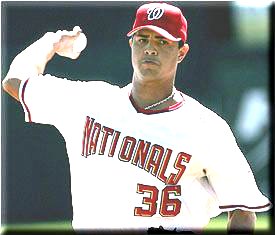 hits in a no-decision loss to the Braves in 10 innings. His fifth start, against the Reds in Puerto Rico, wasn't nearly as pretty. Although he gave up only 8 hits in 6 innings, 4 of them were home runs (one to current team-mate Jose Guillen) as the Reds beat Armas and the Expos, 7-5. After 5 starts, Armas had a record of 2-1 with a solid .261 ERA. In 31 innings, struck out 23 and walked only 8 batters. He dominated in 4 of his 5 starts.
hits in a no-decision loss to the Braves in 10 innings. His fifth start, against the Reds in Puerto Rico, wasn't nearly as pretty. Although he gave up only 8 hits in 6 innings, 4 of them were home runs (one to current team-mate Jose Guillen) as the Reds beat Armas and the Expos, 7-5. After 5 starts, Armas had a record of 2-1 with a solid .261 ERA. In 31 innings, struck out 23 and walked only 8 batters. He dominated in 4 of his 5 starts.
A dejected Armas boarded the team plane as it warmed it's engines on the tarmac at Marin International Airport in San Juan. He reached his seat and opened the overhead bin and, grabbing his travel bag with his pitching arm, threw it into the bin. He felt a sharp pain shoot through his shoulder. When Armas awoke the next morning in his Montreal apartment, he couldn't lift his arm. It happened again. Armas had torn both his rotor cuff and his labrum. He was done for the season.
The Expos/Nationals' franchise understood the fragile nature of Tony Armas Jr. His father, slugger Tony Armas Sr., missed more than 300 games in his career due to injury. In 1998, the Expos micro-managed their budding star to the point of forbidding him to throw certain pitches for fear of injuring his arm. He was tabbed as the Eastern League's best pitcher the previous season, and the Expos wanted him protected.
It didn't help.
Armas had sprained his elbow during the 2000 off-season, and was held back during the first part of spring training in 2001.
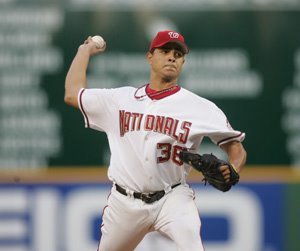 When he was finally allowed to throw hard, he developed tendonitis in his shoulder. Because the arm trouble limited the types of pitches he could throw, batters were waiting on his fastball, and he was hammered hard all season. Armas went 9-14, 4.03 in 2001. He stayed healthy in 2002, and won 12 games for the first time in his career.
When he was finally allowed to throw hard, he developed tendonitis in his shoulder. Because the arm trouble limited the types of pitches he could throw, batters were waiting on his fastball, and he was hammered hard all season. Armas went 9-14, 4.03 in 2001. He stayed healthy in 2002, and won 12 games for the first time in his career.
Armas began spring training 2004 believing that he was 100% healthy. Frank Robinson wanted Armas to remain on the disabled list and continue to regain his strength, but Armas believed he was ready to pitch again. Frank was right. Halfway through the season, Armas developed a tired arm and was only able to start 16 games, going 2-4, 4.88. He came into the Nationals' initial spring training in 2005 fully healthy for the first time in several years. The team, and all of baseball really, believed that 2005 would be Armas' "breakout" year. That lasted until March 28th, when a pulled groin put the 27 year old on the 15-day disabled list. He rejoined the Nationals in May having missed 31 games. He started 19 games, going 7-7, 4.97. In September, he re-injured his groin and was listed as "day to day." A week later, the team placed him on the 60 day DL and he was lost for the season.
The Nationals weren't interested in re-signing Armas during the winner free-agent signing period. They believed that several teams would take a chance on the talented but oft-injured pitcher, and they just didn't have the payroll to take a chance on him. It was thought that Armas would get a contract that called for $4-6 million per year. He got nothing. Oh, the Rockies were interested, but playing a season in Denver wasn't going to do much to help him get a "real" contract in 2007. He ended up re-signing with the Nationals for about $2.1 million. The Nationals hope that he remains healthy and starts 30 games. Armas hopes he remains healthy and pitches well enough to garner a multi-year free-agent contract next season.
A healthy Tony Armas Jr. could have close to 100 wins at this stage in his career. He has 39. The odds are on him staying healthy in 2006. I mean, it just has to happen sooner or later. What could he do if healthy? 13-9, 3.75 sounds about right. If he has that type of season out of the back of the rotation, the team might just do OK. If he doesn't?
I don't want to even think about it.
Move Over Derek Jeter, Here Comes Ian Desmond
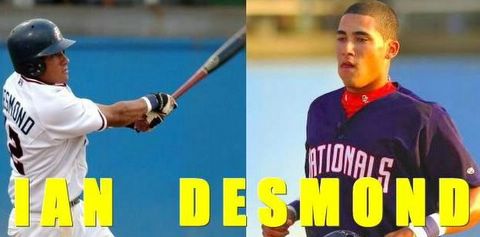 [January 20th] "Jim Bowden, the general manager of the Washington Nationals, picked up his cell phone earlier this week and punched in the speed dial for Dana Brown, his scouting director. Bowden wanted to discuss Ian Desmond, a shortstop the Nationals brought into big league camp after taking him in the third round of last year's draft. "Dana," Bowden said. "You made a mistake when you drafted Desmond." Brown was shocked. "Why?" he asked. "Because you took him in the third round instead of the first round," Bowden replied.
[January 20th] "Jim Bowden, the general manager of the Washington Nationals, picked up his cell phone earlier this week and punched in the speed dial for Dana Brown, his scouting director. Bowden wanted to discuss Ian Desmond, a shortstop the Nationals brought into big league camp after taking him in the third round of last year's draft. "Dana," Bowden said. "You made a mistake when you drafted Desmond." Brown was shocked. "Why?" he asked. "Because you took him in the third round instead of the first round," Bowden replied.
So went the beginning of Barry Svrluga's March 9th article regarding the Nationals' "out-of-nowhere" shortstop Ian Desmond. Desmond, 20, was one of the pleasant surprises of the Nationals' first spring training, batting .306 (11-36) and made several spectacular plays defensively. Of course, there was no chance that Desmond was going to make the team, but he let team officials know that he was going to be a force in the Nationals' future. "It may be a problem" said a concerned Bowen last summer, "We have an all-star shortstop signed for four years, and Ian will be ready long before that." Well, at least Cristian Guzman's play is making his "blocking" Ian Desmond less of a problem.
The raves about Desmond's play aren't based upon his two-year professional career. Playing the equivalent of a full major league season for the Gulf Coast Nationals, Savannah and Potomac, Desmond's numbers look like this: runs [81] -- hits [144] -- doubles [28] -- triples [4] -- homers [7] -- rbi's [52] -- stolen bases [30] -- average [.244] -- on-base percentage [.296] -- slugging average [.339]. Some of those numbers are down-right Guzman-like. Bowden certainly isn't looking at these stats and saying that Desmond is a first-rounder.
Ian Desmond is one of those players whose talent and ability is way ahead of his production. Bowden and the rest of the Nationals' management team doesn't see what he's doing now but rather what he'll be able to do in the future. He's fast. He's sure of himself in the field. He has speed and will have 20-home run power. And he's only 21.
Desmond will start his 2006 season at 'AA' Harrisburg, and may end the season in New Orleans. Last season's numbers didn't warrant a mid-season callup to high-'A' Potomac, and his numbers probably won't warrant a callup to 'AAA' New Orleans this year, but it's probably going to happen anyway. I think Bowden believes that Ian Desmond is the type of player who can mature in the major leagues while helping his team win. Robin Yount was one of those type of players; Ian Desmond might be another. A word that many use to describe the young shortstop is "toolsy," a word that describes a type of player that we all know makes Bowden lose sight of reality (remember the Alfonso Soriano trade??).
How good will Desmond be? Well, Phillies' scout Eddie Thompson says that he has an upside similar to that of Derek Jeter. Of course, I haven't seen him play yet, but from what I can glean from those who have, he's going to be a great one.
The Nationals might have one of the best young infields in the major leagues in a few years, with Ryan Zimmerman and Ian Desmond leading the way.
All this, and he likes Washington too. "I'm very proud to be a National" he told CapitolDugout.com in December. How wonderful. Maybe he could teach Alfonso Soriano a thing or two about being a decent human being.
Slow News Day
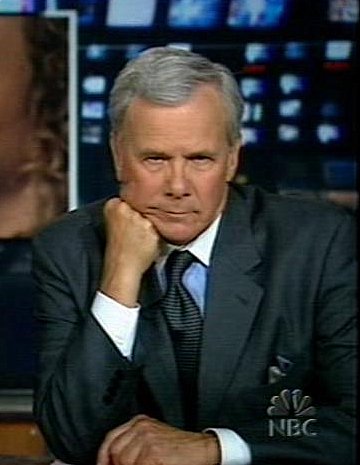 [January 20th] -- We're beginning to enter into an information vacuum, a time when all of the off-season positioning is over and the spring-training excitement is still a few weeks away. Oh sure, there is some news; the team has officially announced that Dave Jageler has joined the Nationals' broadcast team. Out with the old Dave, in with the new. Their voices will be shot through the lithosphere by the blow-torch radio station that used to be WTOP.
[January 20th] -- We're beginning to enter into an information vacuum, a time when all of the off-season positioning is over and the spring-training excitement is still a few weeks away. Oh sure, there is some news; the team has officially announced that Dave Jageler has joined the Nationals' broadcast team. Out with the old Dave, in with the new. Their voices will be shot through the lithosphere by the blow-torch radio station that used to be WTOP.
And that's pretty much it.
No one knows what's happening with Alfonso Soriano and his attitude, and probably no one will until spring training begins.
And so we wait.
Tick-tick-tick-tick.
If I here of something really interesting that happens today, I'll be sure to report it. But, for now at least, I think I'm going to throw my copy of "The Natural" into the DVD and try to take a nap.
And so it goes.
Mediation Quietly Begins
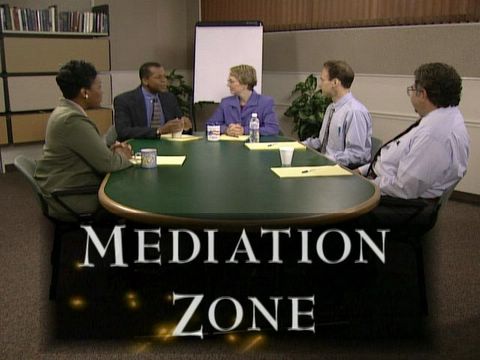 [January 19th] -- An article on the Nationals' official website, kind of a baseball version of Tass, indicated that non-binding mediation between Major League Baseball and the D.C. City Council began sometime Wednesday morning. Forget to tell us, did you?
[January 19th] -- An article on the Nationals' official website, kind of a baseball version of Tass, indicated that non-binding mediation between Major League Baseball and the D.C. City Council began sometime Wednesday morning. Forget to tell us, did you?
Former Detroit mayor Dennis Archer, picked to lead the mediation only two days ago, was in place and in charge when both parties sat down to discuss their problems.
I've been through a mediation, and it's quite an unusual process. Both sides remain in separate rooms, with the mediator carrying proposals, counter-proposals and insults between the two sides. I'll say this, though: it sure beats sitting in a courtroom in front of a judge.
The folks on the city council side have repeated many times that this is a "non-binding' action, that they (the city) can't be forced into acting in a manner not in the city's best interest. However, the process does allow for binding arbitration at a later date if no agreement can be reached.
It's my guess that both sides are slinging arrows with a zeal not seen in D.C. in years. But in the end, the bluster and bad words will give way to an agreement that will finally build that ballpark. For now, though, they'll have their fun.
Nick Johnson: Wes Parker Reincarnate
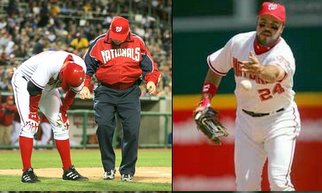 [January 18th] -- Nick Johnson and the Washington Nationals have avoided arbitration by agreeing to a $3.2 million dollar contract, a deal that includes incentives that protects the team against injury and allows Johnson to increase his income by staying on the field.
[January 18th] -- Nick Johnson and the Washington Nationals have avoided arbitration by agreeing to a $3.2 million dollar contract, a deal that includes incentives that protects the team against injury and allows Johnson to increase his income by staying on the field.
Let's assume for a minute that Johnson does remain on the field, that this is the first healthy season for the burly first baseman in his career. Will having him play everyday make the Nationals a better team, and if so, how much?
Johnson played in 131 games in 2005, and hit .289-15-74. Had he played a full 162 games, his numbers would have looked like this: Hits: 163 ... 2B:43 ... 3B:5 ... HR: 18 ... RBI:92 ... Ave:.289. Johnson had a solid .408 on base percent and a good .479 slugging average. If you take his career stats, and average them over a 162 game season, you get similar numbers: Hits:140 ... 2B:31 ... 3B:1 ... HR:18 ... RBI: 78 ...AVE:.265. Johnson has a career .383 obp and a .437 slugging average. Based on what he could have done in 2005, and what he has done over his career, Johnson is going to consistently hit around .290-20-90 with a .400 obp and a .440 slg. Those are "nice" numbers for a National League first baseman, but certainly not "superb" ones.
When I was a kid, the Los Angeles Dodgers had a first baseman by the name of Wes Parker. He hit for a solid average, had a high on-base percentage, and had good gap power. He averaged 11 or so homers a season. He was on the trading block every winter. For the past decade, the Reds have had Sean Casey at first base. He had a high average, a solid on base percent, and good gap power. After years of trying to trade him, they finally succeeded this past winter. For the past two seasons, the Brewers had Lyle Overbay, a first baseman who hit for a (you guessed it) high average, had good gap power and solid on base percentage. They tried to trade him last season with no luck, but moved him this year to make room for a "real" first baseman, Prince Fielder.
There is a stigma attached to first baseman like Nick Johnson. It is believed by many that to make the playoffs consistently, you have to have a slugging first-sacker. For example, the White Sox won their first World Series since the Wilson administration with Paul Konerko at first. The Yankees won all all those championships in the 1990's with Tino Martinez. Beyond that, however, having a less-than-powerful first baseman seems to bring into question a team's manhood, that without a high-production first baseman, they really aren't a baseball team at all.
Baseball team's can survive with a Nick Johnson type of first baseman when they get power from other positions. Shortstops, second baseman and catchers with long-ball power allow a team to carry a first baseman who hits 17 homers in a season. Kevin Millar hit only 18 homers for the world championship 2003 Boston Red Sox, but the team had "value-added" power from catcher Jason Veritek and second baseman Mark Bellhorn.
For the Nationals, Nick Johnson, along with Jose Guillen, is "the power guy." I suppose that as long as the team is treading water, with a .500 record as its ultimate goal, carrying Nick Johnson isn't a bad thing. But as positions are upgraded, when youngsters like Ryan Zimmerman begin to reach their potential, eyes will begin to focus on first base and see Nick Johnson as Washington's Wes Parker, Lyle Overbay and Sean Casey. Whispers will be repeated in the newspapers that the team can't reach the "next level" with him at first base.
I believe that Larry Broadway is the long-term solution at first base. Broadway has repeatedly been recognized as the team's best power hitting minor leaguer. After returning from injuries last summer, Broadway has smoked the ball, at 'AA' Harrisburg, at the select Arizona Fall League and while playing in the Dominican League this winter. His defense isn't quite as good as Nick's, but it's close.
Let's hope that Johnson remains healthy and does put up that .200-20-100 season we've been waiting for. Broadway needs one more year in the minors before making the transition to the big club; he should be ready for the 2007 season. Nick Johnson would bring some quality pitching and open first base for a power hitting first baseman.
I like Nick Johnson, but he's not the long-term answer at first. Larry Broadway is.
The Mediation Man Commeth
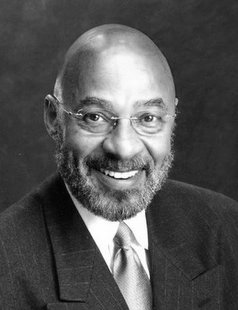 [January 17th] -- Dennis Archer, former mayor of Detroit, has been been tabbed to mediate the stadium disagreement between Major League Baseball and the D.C. City Council.
[January 17th] -- Dennis Archer, former mayor of Detroit, has been been tabbed to mediate the stadium disagreement between Major League Baseball and the D.C. City Council.
Archer was mayor from 1994 through 2001, a period when the city designed and completed two stadium facilities, one for the Detroit Lions and the other for the Tigers.
The hope is, or so I would guess, that because Archer has been through this process before, he will be able to enlighten both sides in the process.
This mediation would be non-binding, but if efforts fail at this level, binding arbitration might be the only answer remaining short of litigation.
Brian Schneider Signs 4-Year Deal, Commits To Nationals' Future
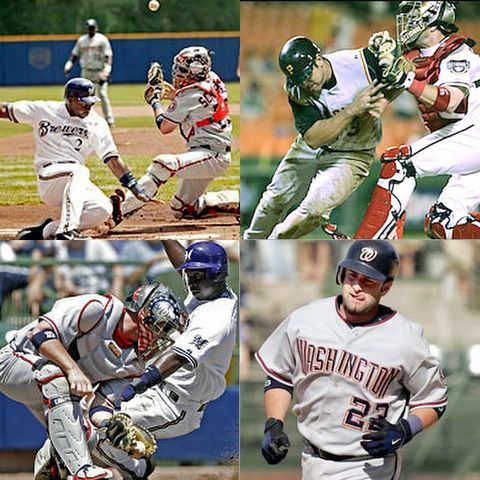 [January 17th] -- I'm glad it was Brian Schneider.
[January 17th] -- I'm glad it was Brian Schneider.
Schneider, 29, signed a four year, $16 million dollar contract on Tuesday that would guarantee his presence on the team through the 2009 season. He could have been a free agent after the 2007 season and would certainly have been coveted by dozens of teams. Instead, he chose to remain with the Nationals. It seems that Schneider accepted quite a "home-town" discound to remain with the team. He would have likely commanded a free-agent contract worth $7-8 million per season in 2008.
Schneider is considered the best defensive catcher in the league today, and has led the National league in throwing out base-stealers the past two seasons. He is by far the bes t at blocking pitches in the dirt. His play-calling is tremendous.
t at blocking pitches in the dirt. His play-calling is tremendous.
For a defensive catcher, however, the guy sure can hit. He can be counted on to hit around .260 with 10 homers and close to 60 RBI's. Most impressively, he has become a solid contact hitter.
He struck out only 45 times in 2005 and has one of the lowest strikeout to at-bat percentages on the team.
Finally, someone on the Nationals' roster has committed to a long-term relationship with both the city and the team. The contract gives Schneider security for the next four years and offers the team the opportunity to now address other, more pressing problems.
Thanks, Brian. Finally, someone was willing to commit to baseball in Washington. Perhaps now Bud Selig and Linda Cropp will follow his lead.
Ladson Q&A, Part II
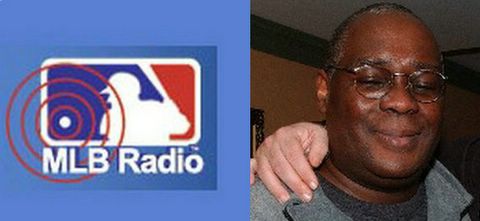 [January 16th] -- Just two days after hearing Bill Ladson interviewed on XM radio, he has resurfaced, this time on MLB radio on the Nationals' official website. Here is a [close] transcript of what Ladson said:
[January 16th] -- Just two days after hearing Bill Ladson interviewed on XM radio, he has resurfaced, this time on MLB radio on the Nationals' official website. Here is a [close] transcript of what Ladson said:
"Jose Guillen has a bad rap. He has been easy to work with over the past year and has been a joy to interview." Now, Alfonso Soriano, well, I talked to him once after the trade and asked him about playing the outfield. He wasn't "pleasant" to talk to.
"I'm afraid how Robinson is going to handle having Soriano on the club. Last season, everyone thought that Frank should have benched Vinny Castilla in September and played Ryan Zimmerman, Everyone but Frank, that is. I don't know what's going to happen exactly, but it's not going to be pretty."
"Many Nationals' players have talked to Alfonso Soriano and tried to get him to accept a move to the outfield. None of them have had any success, even his neighbor Jose Guillen."
[RESPONDING TO WHETHER BOWDEN THOUGHT OUT THE SORIANO TRADE] -- I' m convinced that Bowden got Soriano only for his bat. Bowden has loved Soriano since I've known him, since last year. He in fact tried to get him in a trade last yearin 2005, right up to the trading deadline. He has tried to trade him since, to Boston for Josh Beckett and to Baltimore for Tejada, both "straight up." There is no way he's getting traded now.
"I think the team has gone backwards. They lost two good pitchers in Hector Carrasco and Esteban Loiaza, and replaced them with Tony Armas Jr. and Ramon Ortiz. One guy had shoulder surgery and one was just plain bad, though to be fair, he played in a small park last year. Sure, the team added Soriano, but his numbers will go down playing in RFK."
"Jose Vidro owns second base. I talked to him after Christmas and he feels bad for Soriano's situation, but he's not giving up his spot for him. The media isn't doing their homework -- it's very likely that Vidro will start the year on the DL and Soriano will play second base. Also, you've got two doctors in disagreement; one says surgery and the other says rest. So who knows."
So, in the words of Paul Harvey, "Now you know the ..... rest .... of ... the ... story.
This Is How Predictions Are Supposed To Go
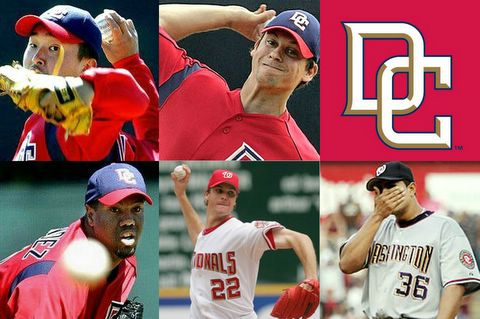 [January 16th] -- Well, I was close.
[January 16th] -- Well, I was close.
Back in January, I wrote the following article regarding the Nationals' starting rotation and their chances for 2005:
"I have been listening to the naysayers for several months now regarding the Nats' starting pitching for the upcoming 2005 season. Barring health issues, where's the problem? Look at the ERA averages for our starting four over the past three seasons:
- Armas: 4.21
- Hernandez 3.78
- Day: 4.01
- Ohka: 3.92
I think those are very good ERA's for this hitter's era. If Armas wins 14, Hernandez 16, Day 12 and Ohka 10, the Nats have 52 wins from the starting four. For comparison, I opened my Baseball Encylopedia to the 1969 Washington Senators, and the wins broke down this way:
- Starting pitchers: 54 wins
- Bullpen pitchers: 32 wins
- Total wins: 86
The 2005 Nats should have 52 wins from the starters, 30 from the bullpen, for 82 wins. A .500 season, something we'd all be happy to have. We'll see.
Well, the 2005 Nationals ended up having 54 wins from the starters, 27 wins from the bullpen for a total of 81 wins. I was one game off in my prediction. [Pat me on my back here]
Of course, the starting staff isn't close to what I envisioned, so perhaps my crystal ball just got lucky. If I get the 2006 season right, though, be looking for a Beltway Boys toll-free number to be added to my site. Need to know the winner of tonight's game? Call me. Need to know what your wife wants for her birthday? Call me.
Well, it could happen.
Bowden May Have Stumbled Into Nationals Future Need For Speed
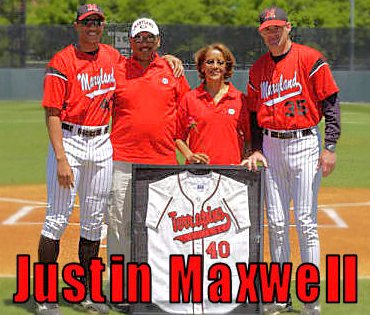 [January 14th] -- There is no question that the Washington Nationals drafted a player in the MLB 2005 amateur draft who will become the key player in the team's long-term future.
[January 14th] -- There is no question that the Washington Nationals drafted a player in the MLB 2005 amateur draft who will become the key player in the team's long-term future.
You might be surprised to find out, however, that the "key" player very well might not be Ryan Zimmerman.
The Nationals signed outfielder Justin Maxwell last October, the team's second overall pick, taken in the 4th round of the draft. Maxwell, who graduated from the University of Maryland this spring, had rebuffed the team's efforts to sign him because of the contract's structure and not its financial considerations. Team officials described the negotiations as "amicable." My guess is the contract addressed his injury plagued seasons of 2004 and 2005.
Injuries the past two years robbed Maxwell of what would have been a sure first round selection in the amateur draft.
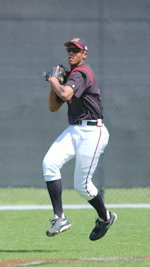 An inside fastball during spring practice in 2004 broke a bone in his forearm, forcing him to miss the entire season. He tried to play in the Cape-Cod League that summer but broke a finger there effectively ended his year. Seven games into Maryland's season this year, he broke a bone in his hand, ending his collegiate career. He is at full strength now and will likely begin the 2006 season at class 'A' Potomac.
An inside fastball during spring practice in 2004 broke a bone in his forearm, forcing him to miss the entire season. He tried to play in the Cape-Cod League that summer but broke a finger there effectively ended his year. Seven games into Maryland's season this year, he broke a bone in his hand, ending his collegiate career. He is at full strength now and will likely begin the 2006 season at class 'A' Potomac.
Maxwell has been a star at every level. He played in the Cape-Cod League in 2004 and hit .307 with 47 hits and 2 home runs. In his abbreviated 2005 season at Maryland, the 6'5", 220 lb outfielder batted .455 with 3 home runs and 10 RBI's. His talent is well known to most soouts and general managers in the major leagues.
He was drafted in 2001 by the Orioles, and again in 2004 by the Rangers. Texas scout Grady Fuson called Maxwell "one of the top college players" in 2004, and said that Maxwell "could very well be one of our most important selections in some time." Maxwell didn't sign with the Rangers.
Maxwell is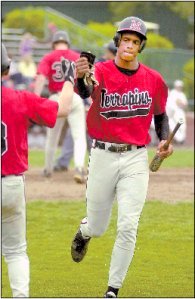 both powerful and fast, and is often compared to former Met great Daryl Strawberry. His swing has a high arc, allowing him to not only drive balls, but drive them very high and very deep.
both powerful and fast, and is often compared to former Met great Daryl Strawberry. His swing has a high arc, allowing him to not only drive balls, but drive them very high and very deep.
Defensively, he is major league ready today, according to a scout from the Orioles' organization.
While his physical tools might be compared to Strawberry, his personality is more like Cal Ripken, which is good for him and great for the organization. Sean Welsh, GM of the Bourne Braves, a summer-league team Maxwell played for two seasons ago, said that he's as apt to be reading his Bible as he his sanding his bats in preparation for the next day's game.
It looks as if those injuries that kept Maxwell off of the diamond the past two years are more about being in the wrong place at the wrong time than problems with joints or muscles. Maxwell will need time to make up for all those lost at-bats the past few years, but it seems that when he does reach D.C. [likely in 2008], he'll be a fixture in the outfield for some time to come.
Kudos, Jim Bowden. You did well.
Ladson Does Q&A On XM Satellite Radio
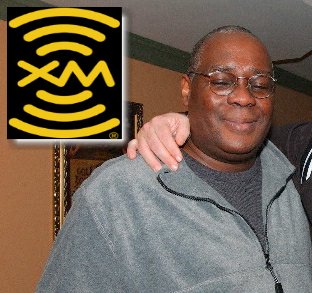 [January 14th] -- Bill Ladson, MLB.com's beat writer for the Washington Nationals was a guest on XM radio's baseball channel Friday evening. I wrote down what he said as fast as I could, then remembered afterwards that my new "xm2go" walkman receiver can record five hours of airtime.
[January 14th] -- Bill Ladson, MLB.com's beat writer for the Washington Nationals was a guest on XM radio's baseball channel Friday evening. I wrote down what he said as fast as I could, then remembered afterwards that my new "xm2go" walkman receiver can record five hours of airtime.
Rats.
On Sammy Sosa:
"I think that while many fans are concerned about Sosa's past problems, the Nationals are more concerned about adding his bat then his baggage"
"It's a good thing that Jose Guillen is endorsing the team's attempt to sign Sosa. They're friends and neighbors in Miami."
"Jim Bowden told me that Sosa had other offers but I haven't been able to confirm them yet."
"Part of Sammy's problem last year was trying to adjust to a new league. Some players have a hard time switching leagues. He'll do much better next year in a National league town."
"If Sammy Sosa makes the team, Marlon Byrd will be the team's #four outfielder. If Sosa isn't part of the scenario, Byrd could compete against Ryan Church and win the starting centerfield job."
On Alfonso Soriano:
"I doesn't really matter how many home runs Soriano might hit at RFK. It matters how many runs he drives in."
"If Jose Vidro is hurt, Soriano will be the second baseman. If Vidro is healthy, he'll be in the outfield. He doesn't want to cause problems in the last year of his contract before becoming a free agent."
"The people who are complaining about Aflonso haven't been doing their homework. No one knows if Jose will be healthy, and he might very well be the team's every-day second baseman."
On the new coaching staff:
"Jim Bowden has told me that third-base coach Tony Beasley is the next Jim Leyland."
"The team will be different next year from a coaching standpoint. Page, Lopes and Beasley will bring a much different attitude to the clubhouse."
"Mitchell Page is a great hitting instructor, and he's already made an impact with some of the team's young players as well as Marlon Byrd."
On other "stuff:"
"The stadium deal will get worked out, but it may take a few more weeks to get done.
"I wouldn't count on the Nationals signing free-agent Jeff Weaver. Scott Boras (Weaver's agent) told Jim Bowden that negotiations start at $10 million per year."
It was a good interview. Towards the end, listeners were invited to call in and ask questions, but familial requirements (diaper duty) caused me to miss that part of the program.He's Not Your Father's Sammy Sosa
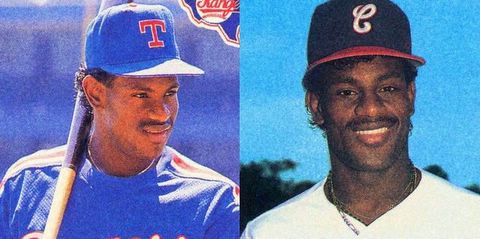 [January 13th] -- The Nationals' blog-o-sphere is going apoplectic with the news that Sammy Sosa and his agent are talking to team GM Jim Bowden about joining the Nationals.
[January 13th] -- The Nationals' blog-o-sphere is going apoplectic with the news that Sammy Sosa and his agent are talking to team GM Jim Bowden about joining the Nationals.
The Nats' blogging nation is probably right. That is, unless they're wrong. And I can assure you, they are one or the other.
The big guy over at Banks Of The Anacostia reported yesterday that Jimmy B. added an addendum to the ESPN article that first broke this story. It's being repeated in this morning's Baltimore Sun as well: "We would have interest in bringing a healthy Sammy Sosa into camp on a non-guaranteed minor league deal and giving him an opportunity to make the team," he told the Web site in an e-mail."
First thing, don't believe the cards being dealt when negotiations are just beginning. You demand several things that aren't important so that they can be "given up" in the name of "good faith." I don't doubt for a moment that Bowden worried that his fan base might head to the Home Depot to buy some good lynching rope, and so he shot that e-mail off to ESPN as a means of self preservation. See, he's negotiating with Sosa, and with us.
The words of assurance, words like "healthy," "non-guaranteed," "minor league" and "opportunity to make the team" placate the fan base ( I feel placated, don't you?). I've already noticed a change of heart on several of the Nats' bulletin board sites. This one sums it up pretty well: "I don't know what the big deal is. I was worried at first too, but it's not guaranteed money and Sosa has to make the club. What do we have to lose?'
Bowden has those very same "cards" at the table right now with Sammy. Sosa is probably demanding $5,000,000, a private jet, and all the clean underwear he can use. Sammy will say, "Hey, I been berry berry gude to besboll, I no have to make team." Bowden will counter, "Gee, I don't know Sammy -- maybe I'll consider it if you lose the private jet." On and on they'll go until they both get what they wanted in the first place: a one-year deal calling a for a guaranteed contract that is heavily laden with incentives. Isn't that really just as good as a minor league deal? If Sosa doesn't produce, he's released and the team has a relatively minor financial obligation to eat. If he does return to form, Bowden will gladly pay him for his production. This way, Sosa is faced the embarassment of having to make the team or sign a minor-league contract.
No, don't believe all of this whoo-ha that you're reading right now.
What Sammy Sosa can do for the Nationals:
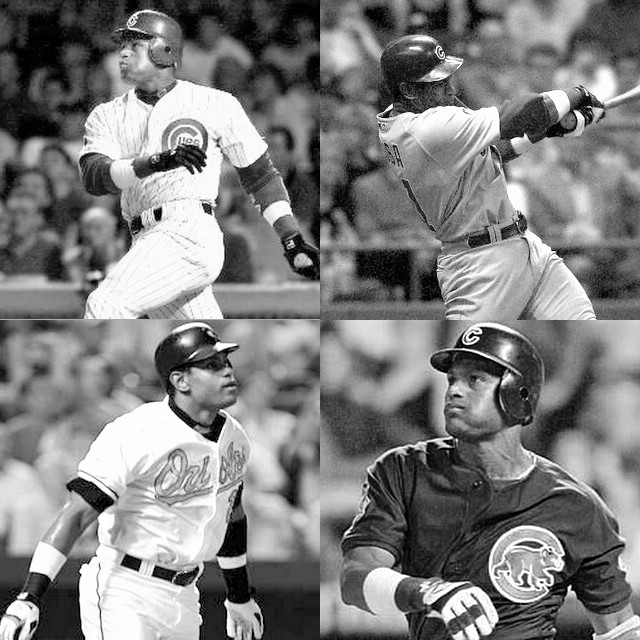 The same thing he could have done last year had the team traded Terrmel Sledge and Brendan Harris to the Cubs for the all-star as almost happened - he would have brought a high-profile face to Washington. The newness of baseball in D.C. will have worn off and will have an effect when the Nationals take the field at RFK next April. Some casual fans surely won't be back. Compound that with the animosity that true fans like us feel for both Major League Baseball and the D.C. City council, and attendance, radio listenership and TV viewership may take a fairly significant dip. Having Sosa on the team might create some excitement, even if just for a short while. Babe Ruth did it for the Boston Braves for part of the 1935 season before finally retiring. Sosa could to.
The same thing he could have done last year had the team traded Terrmel Sledge and Brendan Harris to the Cubs for the all-star as almost happened - he would have brought a high-profile face to Washington. The newness of baseball in D.C. will have worn off and will have an effect when the Nationals take the field at RFK next April. Some casual fans surely won't be back. Compound that with the animosity that true fans like us feel for both Major League Baseball and the D.C. City council, and attendance, radio listenership and TV viewership may take a fairly significant dip. Having Sosa on the team might create some excitement, even if just for a short while. Babe Ruth did it for the Boston Braves for part of the 1935 season before finally retiring. Sosa could to.
But I think he can do even more. Last year's poor showing should be weighted when looking at Sosa's decline the last few seasons. He had a staph infection in his foot and problems with an infection under a toe nail in 2004. No way a professional baseball player can plant his foot properly if it's a breeding ground for bacteria. In 2003, Sosa hit .253-35-80 in 126 games before his troubles began. Playing the entire year, he should have hit somewhere around .253-44-102. If you figure that he's lost 12% of his game, and will lose another 10% because of park differential, he might hit .260-35-80 (a bit higher average because outfielders would play deeper at RFK, giving him a few more "drop in" singles).
What if he doesn't hit that well? How about .260-20-80? That's almost a certainty (unless the foot 'thing' wasn't the culprit last season and his lack of skills and lack of juice was). Ryan Church could then move over to center, and would likely produce somewhere around .280-20-75. Add Guillen's .300-27-100 potential (assuming he's healthy) and the Nats have a much better outfield than they did in 2005.
Alfonso Soriano could then be traded for pitching, and having Sosa in the outfield for a season would buy the team some time until a new owner is in place. And there's no question that the owner would open up his pocketbook in 2007, making the team able to plug some holes caused by Bowden's many boo-boo's.
If the Nationals can't sign Sosa, the alternative will be Brandon Watson. Does anyone really think that there is a scenario where Watson would be more productive for the Nationals than Sammy Sosa?
Give him a chance. If nothing else, it'll make spring training more interesting.
The Pirates Of The Nations Capital
 [January 13th] -- "The Pirates of the Caribbean" is one of my favorite movies. As the "undead" pirates of the Black Pearl swarm the island of Jamaica in search of the last of the cursed pieces of gold, they find young Elizabeth Swann hiding in her father's mansion and are about to do the unspeakable to her. She suddenly shouts, "Parlez!," pirate-talk that means roughly, "safely-speak." She was given safe passage to discuss with Captain Barbossa their "disagreement."
[January 13th] -- "The Pirates of the Caribbean" is one of my favorite movies. As the "undead" pirates of the Black Pearl swarm the island of Jamaica in search of the last of the cursed pieces of gold, they find young Elizabeth Swann hiding in her father's mansion and are about to do the unspeakable to her. She suddenly shouts, "Parlez!," pirate-talk that means roughly, "safely-speak." She was given safe passage to discuss with Captain Barbossa their "disagreement."
After making an agreement with the captain, Elizabeth hands over the gold piece, and is immediately taken prisoner by the crew of the Black Pearl. "You can't do this!" she shouted, "We were under the flag of "parlez. We had an agreement!" Captain Barbossa stopped in his tracks and turned back towards Elizabeth. He leaned in towards the young woman, and with one eyebrow slightly raised, said, "Well Missy, 'Parlez' isn't exactly a set of rules that be ironclad. It's more what you'd call 'guidelines.'" Barbossa went back on his word and Jack Sparrow and young Will Turner then spent the rest of the movie trying to save the govenor's daughter from the crew of the Black Pearl.
Fast forward a few hundred years. Deep within the bowels of the world's most powerful city, politicians, representatives from Major League Baseball and a gaggle of lawyers from both sides hammered out a lease agreement that would protect both the new owner of the Nationals' and the interests of the citizens of Washington. Papers were signed and agreements were reached. Now, all that had to happen was for the city council to approve it by December 31st for it to take effect. It never happened. The politicians didn't like the agreement and so they've been trying to get out of it. Bud Selig and the boys climbed on board the S.S. Washington and asked Captain Linda Cropp why the city wouldn't honor their contract that the city signed in good faith. Linda Cropp stopped, and slowly turned around. She walked back towards Selig, and, leaning in, with one eyebrow raised slightly higher than the other, said, "Well, Buddy, a contract isn't exactly an ironclad agreement that has to be followed. It's more like what you'd call 'guidelines."
Since the agreement was signed, the city council has been trying to find a way, any way, of honoring it. They don't think it's "fair" so that makes it "null and void."
Now, they have ammunition. They have hired a Chicago sports law firm that has dealt with the construction of many sports facilities, including FedEx Field here in Washington. They say, their words now, that the agreement is "is probably the most generous in the history of organized sports."
I could care less. If their was concern that the agreement was one-sided, then it should never have been signed. Each step of the way, the city council veers from standard business practices and creates their own "me - me - me" way of running the city. Don't get me wrong. A pox on both their houses. Sure, the baseball boys tried to screw the city, and they succeeded. Whose fault is that? Just as it wasn't Alex Rodriguez' fault when the Rangers signed him to that bloated $255 million dollar contract, neither is it baseball's fault that the city agreed to their excessive demands.
There is now talk that the city might be willing to throw money at Major League Baseball, and let them build their own park the way they want it (Thanks to DCBB for this nugget). All of the city's machinations won't change the fact that they have an agreement with MLB and that the agreement should be honored.
It's becoming clearer now how the city lost two baseball teams, two basketball teams, and had two franchises build new facilities outside of the city limits. Why deal with the pain?
It's not worth it.
But I'm Much Better Now
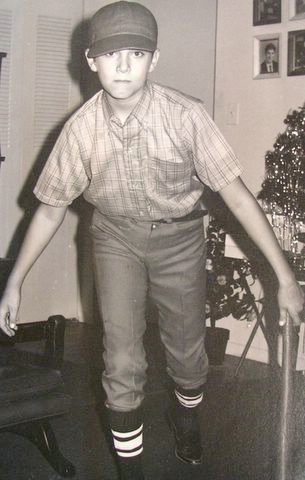 [January 12th] -- For my regular readers (and thanks to both of you), you read me wax poetic about "when I was a kid." You know. "When I was a kid, [enter sappy baseball story here]." You might begin to wonder if any kid could be that one dimensional.
[January 12th] -- For my regular readers (and thanks to both of you), you read me wax poetic about "when I was a kid." You know. "When I was a kid, [enter sappy baseball story here]." You might begin to wonder if any kid could be that one dimensional.
Oh yeah.
This is a picture of me taken in 1968, when I was twelve. We were living at the Lake Barcroft apartments, just a few blocks down Leesburg Pike from Seven Corners. If memory serves, I had just roped a double down the line off of Jim Perry of the Twins, and I was coming out of the batters box, heading towards first.
Or so I believed.
I wish I could tell you that I didn't wear baseball socks with dress slacks and penny loafers all the time, but I did. It seemed so, oh, I don't know, so "normal" I guess. It wasn't of course.
Look over my left shoulder. That's a Christmas tree. Not much of one to be sure. My mother had died less than year earlier, and my father wasn't ready to begin celebrating life again. But here it is, Christmas, and I'm wearing a short sleeve shirt and baseball garb [shake head in disbelief here]. After my dad took t his picture, I went downstairs and bounced a tennis ball off the side of the apartment building. I flipped my fantasy switch to the on position and was instantly transported to RFK. Danny Cater lines a shot down the third base line, snagged by Kenny McMullen. Popup to short, Brinkman circles under and makes the catch. Fly ball to left ... and Howard drops the ball! (hey I was being realistic). There was ten inches of snow on the ground.
his picture, I went downstairs and bounced a tennis ball off the side of the apartment building. I flipped my fantasy switch to the on position and was instantly transported to RFK. Danny Cater lines a shot down the third base line, snagged by Kenny McMullen. Popup to short, Brinkman circles under and makes the catch. Fly ball to left ... and Howard drops the ball! (hey I was being realistic). There was ten inches of snow on the ground.
I was wearing an old Air Force parka. I could see my breath and couldn't find the ball when it dropped into the snow.
And I was playing baseball.
Yes, a kid can be that one dimensional.
NOTE: This is my son Korth. He knows how to dress for baseball much better than his daddy ever did.
RFK Redux
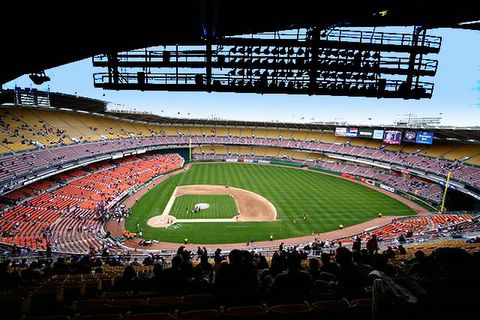 [Jan. 12th] - When I was a kid, I got to see a dozen or so Senators' games at RFK every summer. Although I loved the sleek, clean lines of the state-of-the-art facility, I never understood why RFK didn't have outfield bleacher seats. When Riverfront and Three Rivers stadiums were opened, RFK was the only one of the five cookie-cutter parks that didn't have bleachers.
[Jan. 12th] - When I was a kid, I got to see a dozen or so Senators' games at RFK every summer. Although I loved the sleek, clean lines of the state-of-the-art facility, I never understood why RFK didn't have outfield bleacher seats. When Riverfront and Three Rivers stadiums were opened, RFK was the only one of the five cookie-cutter parks that didn't have bleachers.
I would spend much of my time in school doodling new configurations for RFK that always included outfield seats (I guess that explains why I'm a 49 year old college senior, doesn't it??). No matter how hard I tried, though, my efforts never looked very real.
With the myriad of photoshop-type programs available today, I can create a new RFK in minutes. Ever wondered how the stadium would look with double-decked outfield stands? No problem. Give me thirty seconds and I'll show you. Actually, the image above took about fifteen seconds to create.
So here's my final creation of RFK with outfield seats -- a design that I started in 1968. I completed this image on my laptop while sitting in my colonial history class yesterday. (Sigh) You would think I would have learned my lesson my now, wouldn't you?
Weird Whispers Winding Way Through DC's Back Alleys
 [January 12th] -- I don't know what to make of this. I came across a couple of stories just before bed-time that made my toes curl just a bit. I don't know if I'm excited or worried.
[January 12th] -- I don't know what to make of this. I came across a couple of stories just before bed-time that made my toes curl just a bit. I don't know if I'm excited or worried.
Weird Story No. 1: ESPN Deportes is publishing a story with the headline "Sammy Sosa Could Be Headed To Washington Nationals." Hmmmm. Initially, the story was that the deal was all but finished, but now it seems that Jim Bowden and Sosa's "people" are in preliminary negotiations. The story says that Sosa would man left-field for the Nationals, with Jose Guillen remaining in right and Ryan Church taking over center. This would allow Bowden to trade Soriano for pitching and/or prospects.
"We're going to sit down and see what happens," Sosa said by telephone from Miami, his offseason home. "It's a good opportunity. It's a good chance. We don't know anything yet, but we're going to sit down and talk." Don't think that the Nationals are high on Sosa's list, though. The Washington Post is reporting that there are no other teams looking to sign the 37 year old. Sosa has guaranteed money waiting for him in Japan, but he really wants to hit that 600th homer here in America. As he likes to say, "America been berry berry gude to me."
Had he remained healthy, Sosa probably would have hit around 20 or so homers and driven in 70-75 rbi's. His .221 batting average isn't good, however, and his .295 on-base percent is downright Soriano-like. And that isn't good either. Looking at his stats the last few years, there is an obvious and steady decline. Sosa might have another good year left in him, though. His ego wants to show the baseworld that is was talent, and not steroids that allowed him to hit 588 career home runs. Could he hit .270-20-85? Sure, but he could also hit a lot less. We'll see.
Weird Story #2 Basil at Federal Baseball and Rotoworld.com are reporting that Jeff Weaver might still be on the Nationals' radar screen. I don't think this story has legs. I do, however, believe the Sosa story. And if Sosa is the real deal, then Alfonso Soriano is no longer in the team's plans, and he'll be traded for pitching, making Weaver duplicative.
Weaver's cost vs. production isn't very pretty. I've never understood this whole concept about signing a guy because he's an "innings eater." What's the point in having a guy who pitches seven innings per start if he loses two-thirds of them?
Hey, I don't make this stuff up. I report. You decide. Sorry. I get a little too "foxy" sometimes.








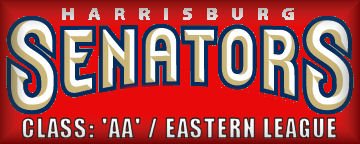
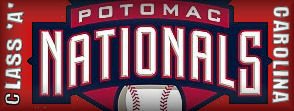

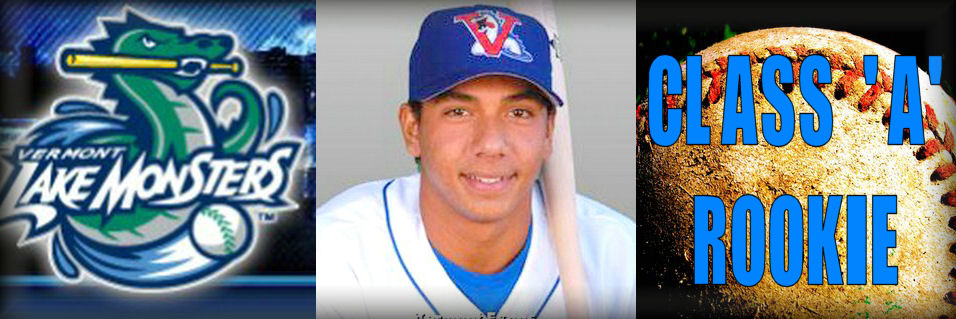











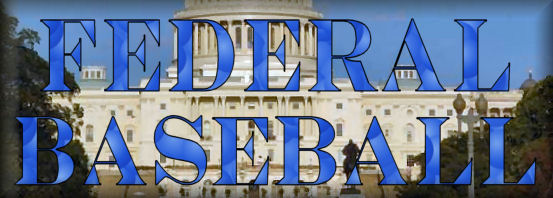



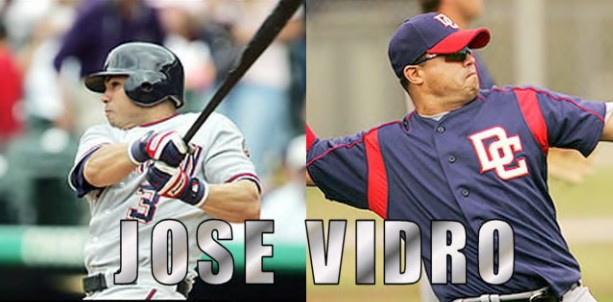




















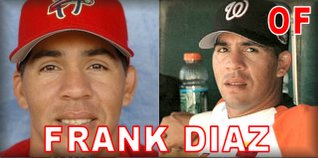

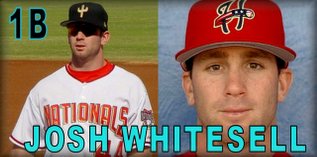
 3) 1926 (road) --- 4) 1936-'37, 1948-'51
3) 1926 (road) --- 4) 1936-'37, 1948-'51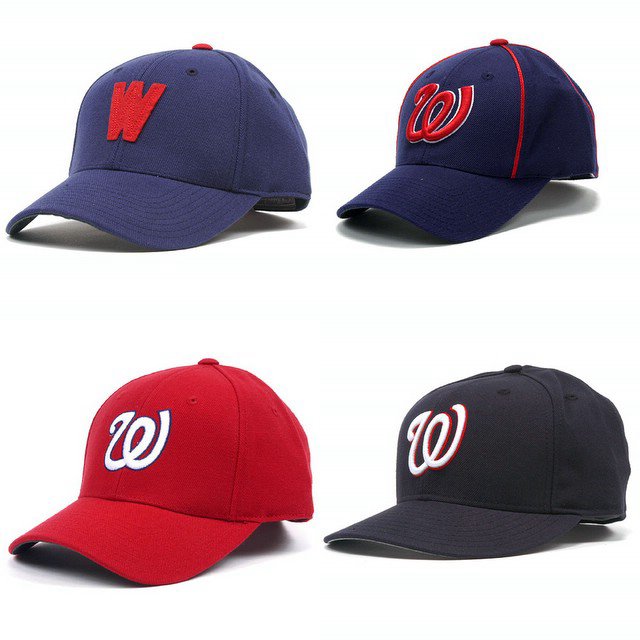 3) 1968 - '71, and 2005 (home) --- 4) 2005 (road)
3) 1968 - '71, and 2005 (home) --- 4) 2005 (road) Buddy Meyer --- Walter Johnson
Buddy Meyer --- Walter Johnson Ed Yost --- Muddy Ruel
Ed Yost --- Muddy Ruel Roger Peckinpaugh --- Joe Cronin
Roger Peckinpaugh --- Joe Cronin Del Unser --- Darold Knowles
Del Unser --- Darold Knowles Ed Stroud - Mike Epstein
Ed Stroud - Mike Epstein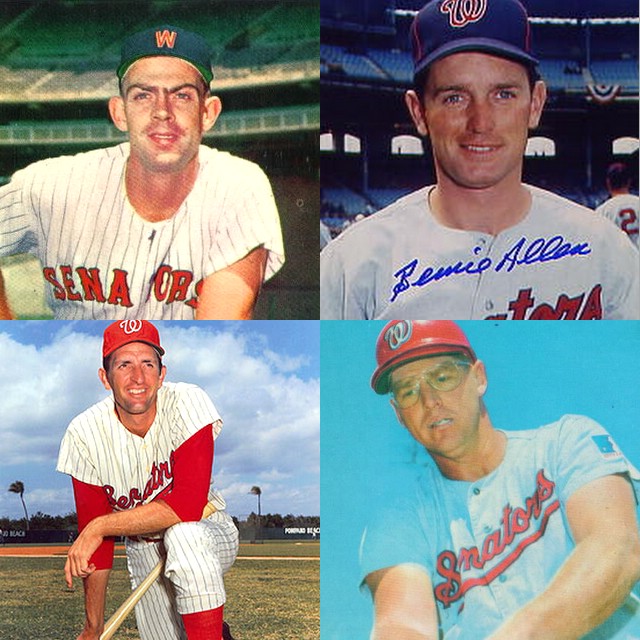 3)1968 -- 4)1969 - 1971
3)1968 -- 4)1969 - 1971